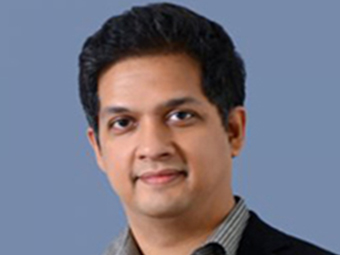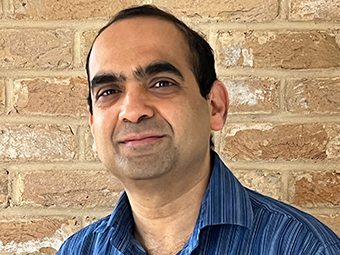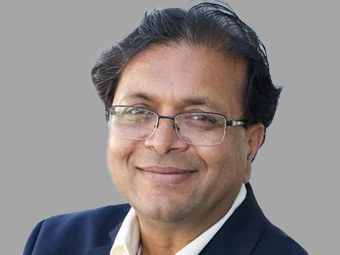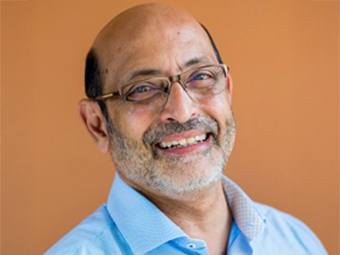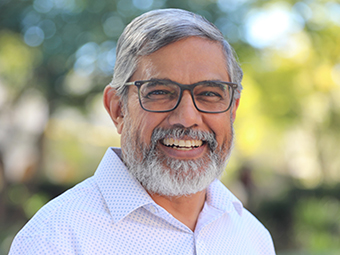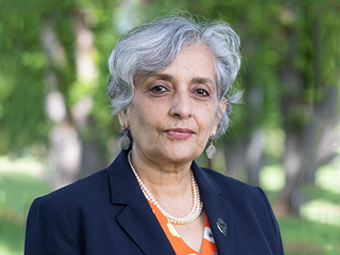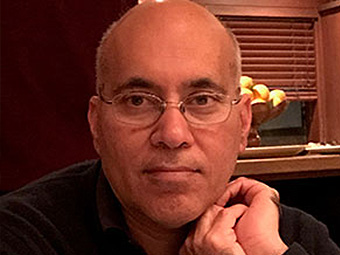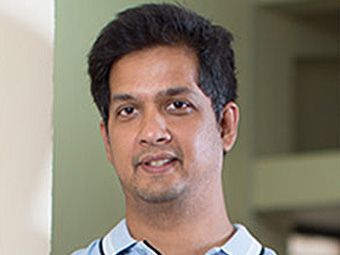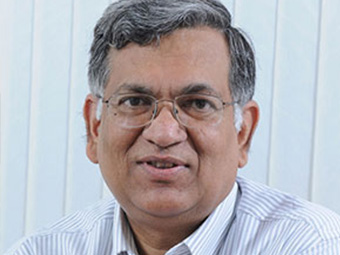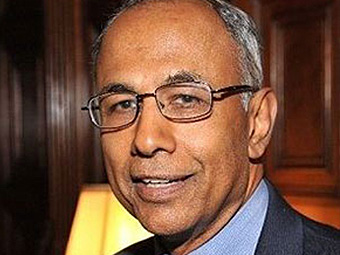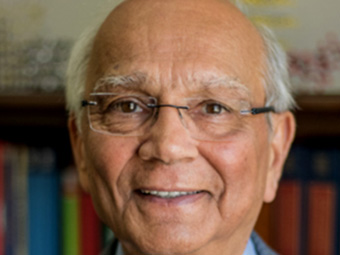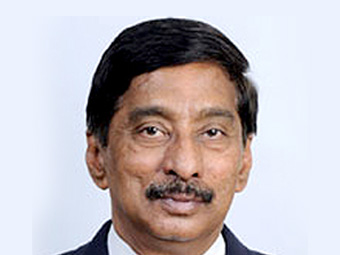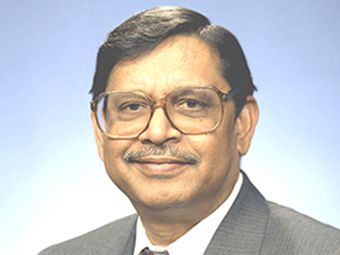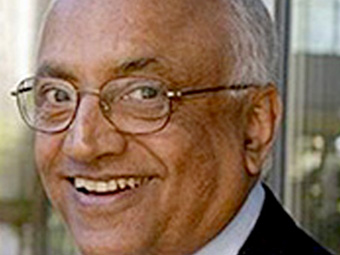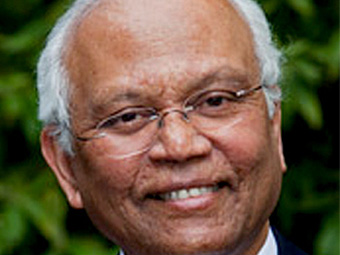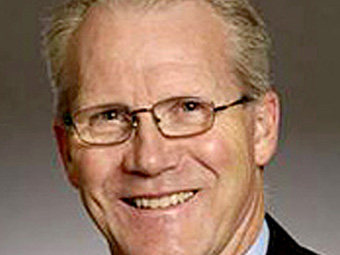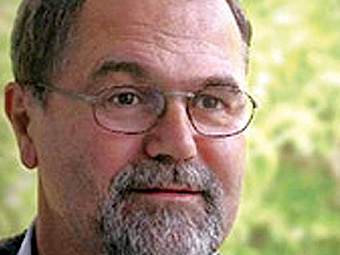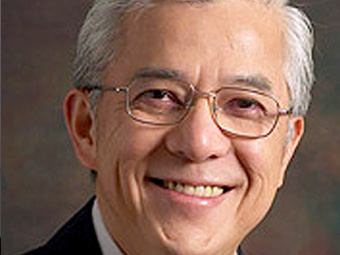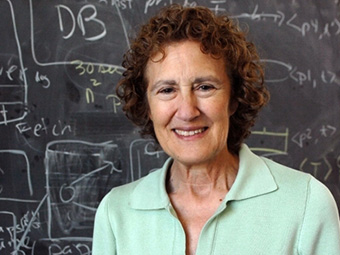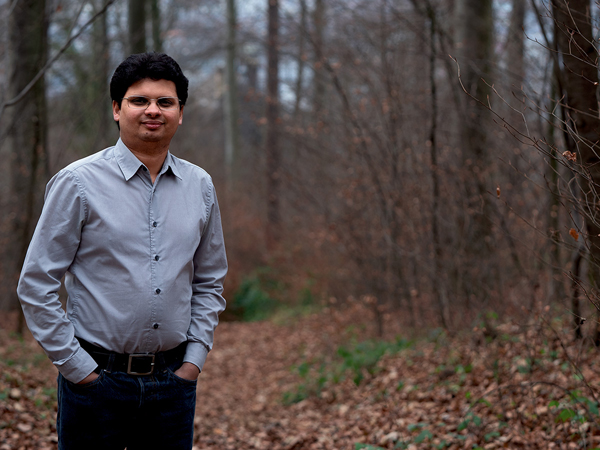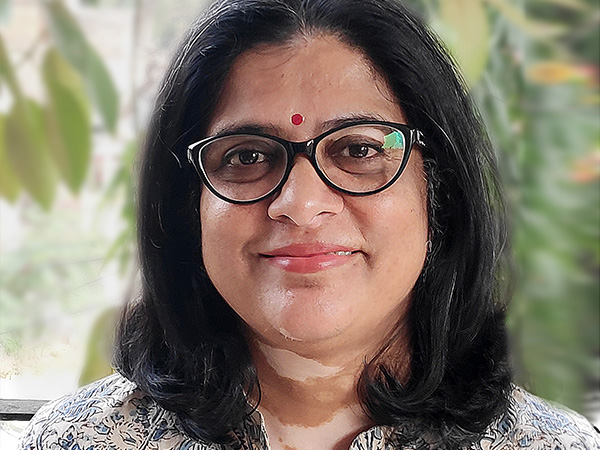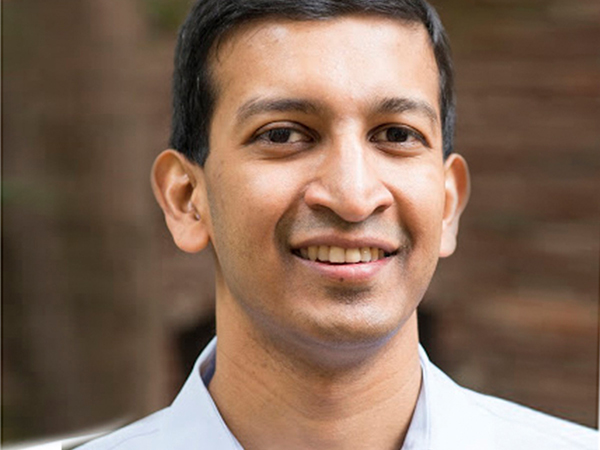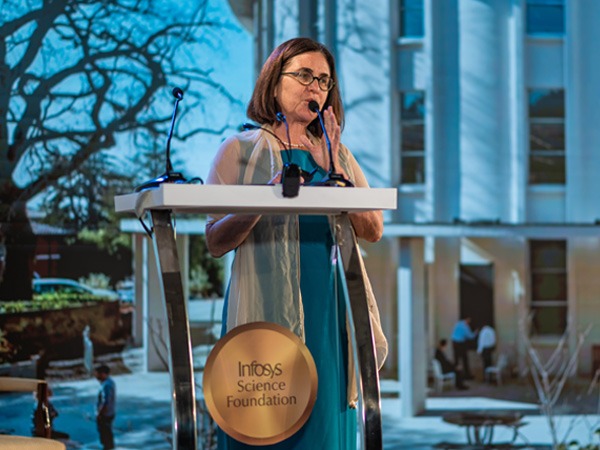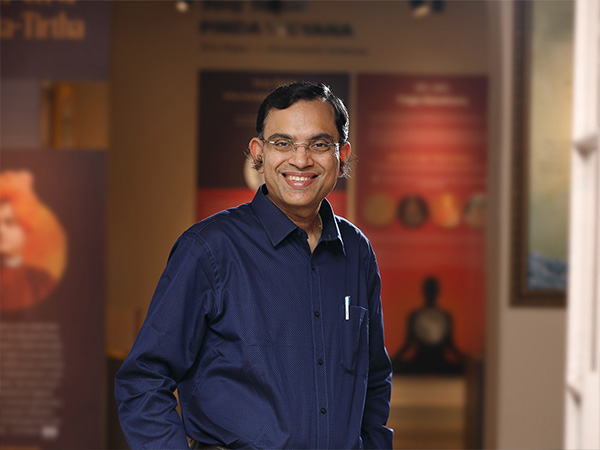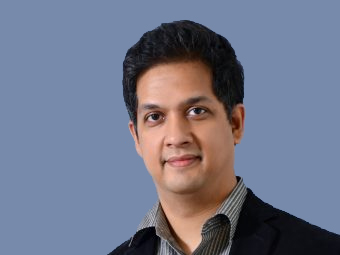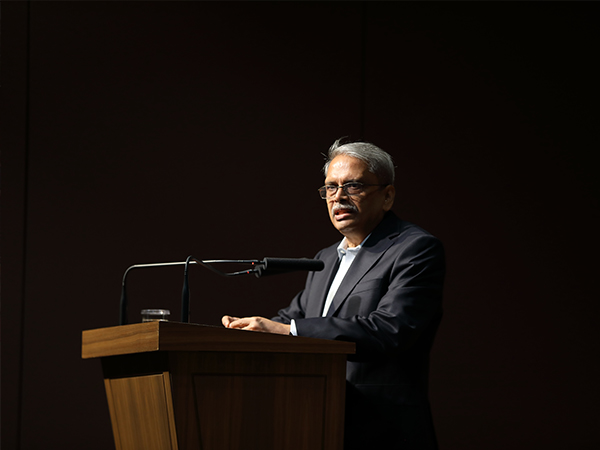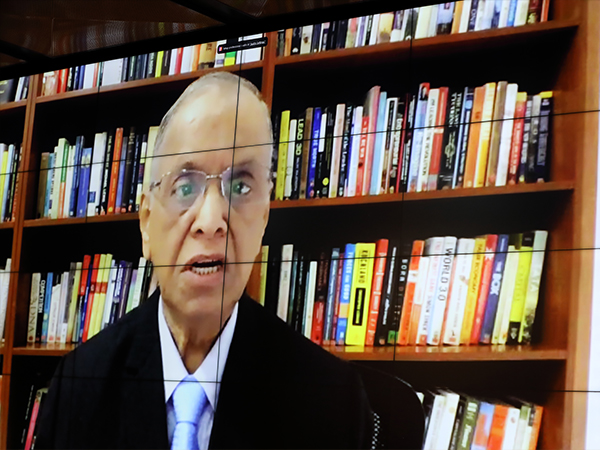
Engineering & Computer Science
A set of disciplines, comprising mathematics, chemistry, computing, life sciences and others, engineering & computer science invents new, and improves existing technology. The Infosys Prize has awarded work in nanotechnology, data science, mobile telematics, material sciences and revolutionary work.
Laureates
Engineering and Computer Science 2025
Sushant Sachdeva
Associate Professor, Mathematical and Computational Sciences, University of Toronto, Canada
Read More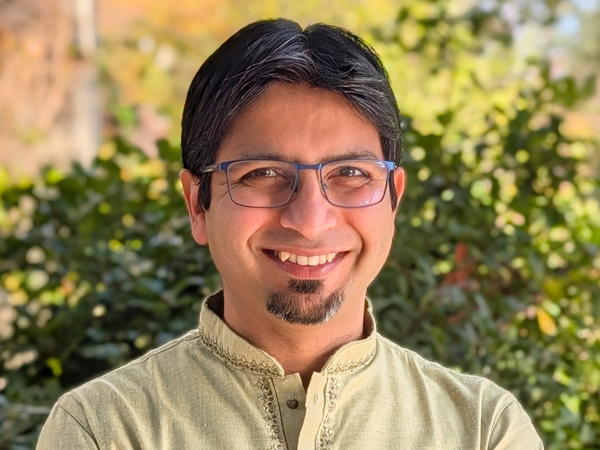
Engineering and Computer Science 2024
Shyam Gollakota
Professor, Paul G. Allen School of Computer Science & Engineering, University of Washington
Read More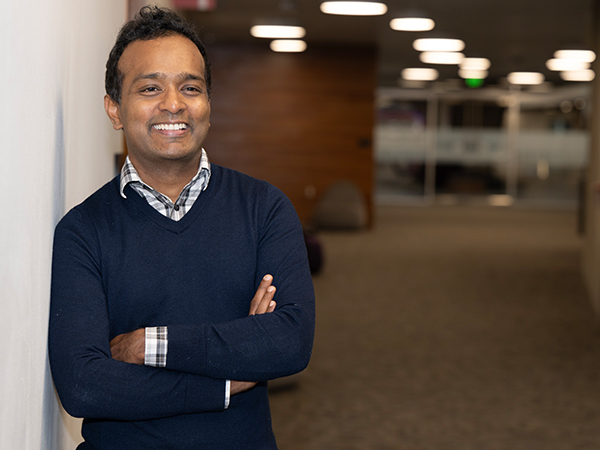
Engineering and Computer Science 2023
Sachchida Nand Tripathi
Professor, Joint Faculty in Civil Engineering and Sustainable Energy Engineering, Indian Institute of Technology, Kanpur
Read More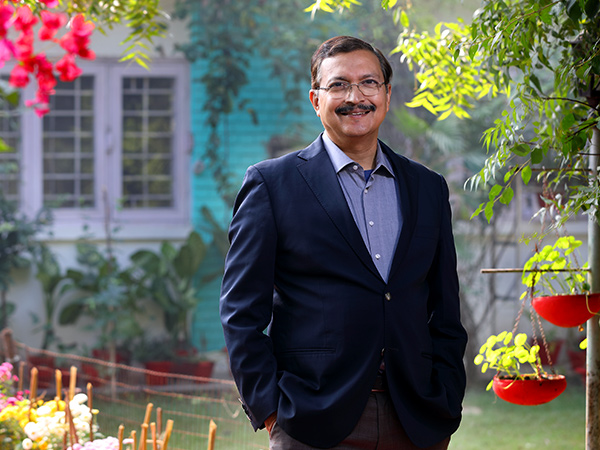
Engineering and Computer Science 2022
Suman Chakraborty
Professor, Mechanical Engineering, and Dean, Research and Development, Indian Institute of Technology, Kharagpur
Read More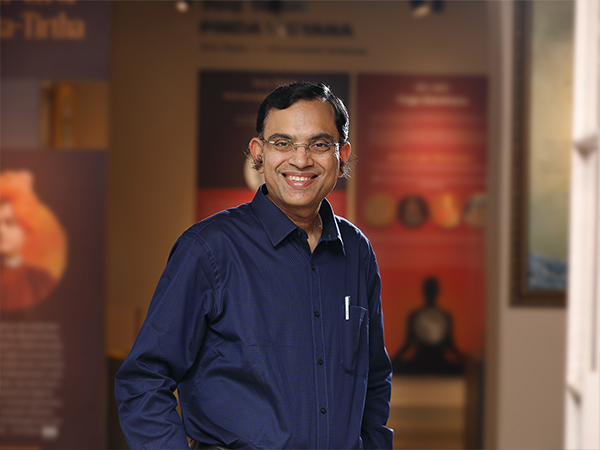
Engineering and Computer Science 2021
Chandrasekhar Nair
Chief Technical Officer, Molbio Diagnostics, Bengaluru, India
Read More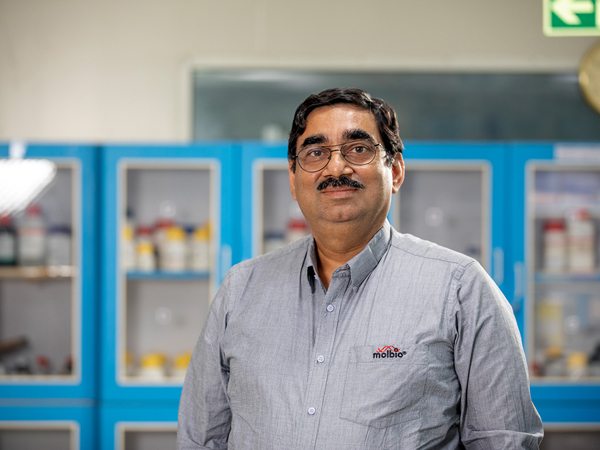
Engineering and Computer Science 2020
Hari Balakrishnan
Fujitsu Professor of Computer Science, Massachusetts Institute of Technology, USA
Read More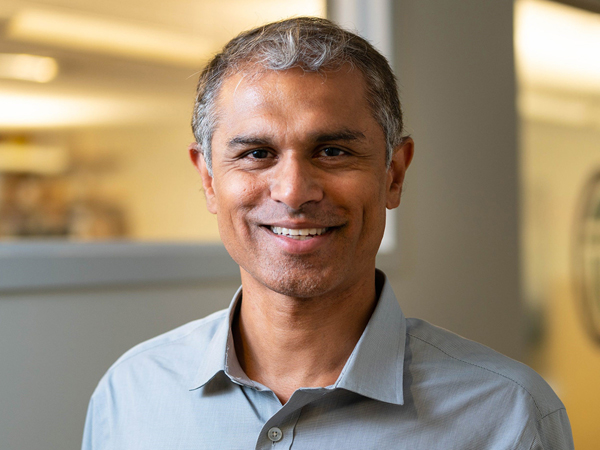
Engineering and Computer Science 2019
Sunita Sarawagi
Institute Chair Professor, Computer Science and Engineering, Indian Institute of Technology, Bombay
Read More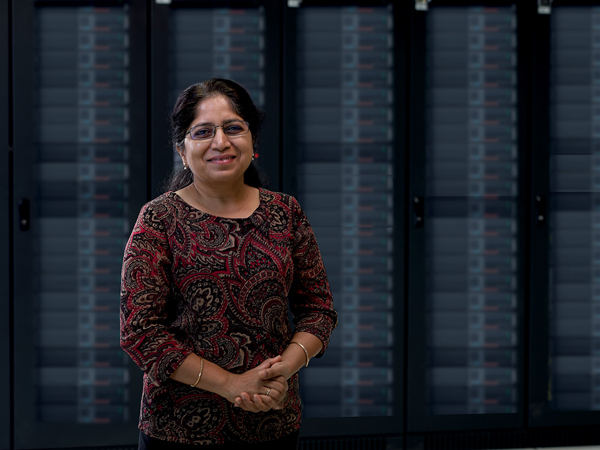
Engineering and Computer Science 2018
Navakanta Bhat
Professor, Indian Institute of Science, Bangalore and Chairperson, Centre for Nano Science and Engineering, IISc
Read More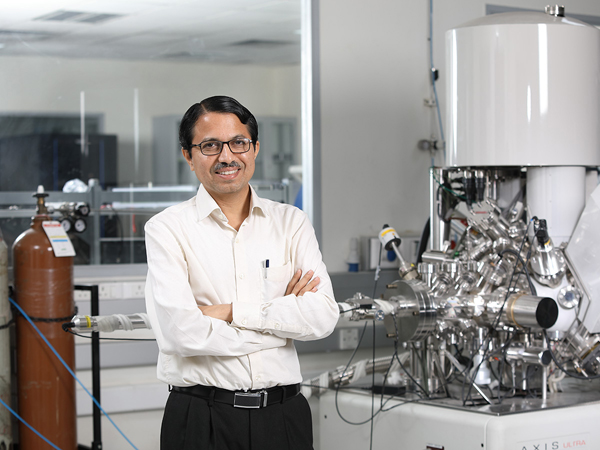
Engineering and Computer Science 2017
Sanghamitra Bandyopadhyay
Director, Indian Statistical Institute, Kolkata, India
Read More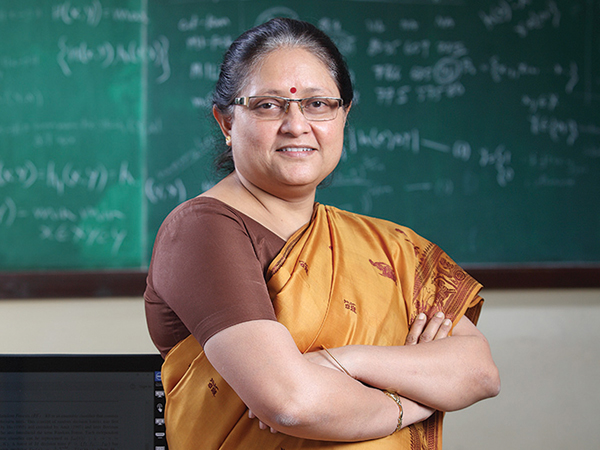
Engineering and Computer Science 2016
V. Kumaran
Professor, Department of Chemical Engineering, Indian Institute of Science (IISc), Bangalore
Read More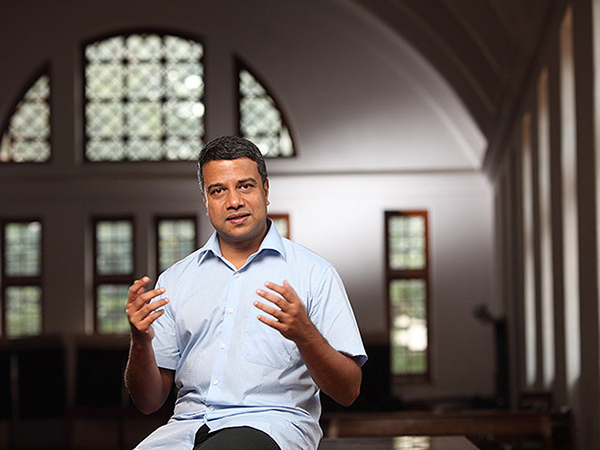
Engineering and Computer Science 2015
Umesh Waghmare
Professor, Theoretical Sciences Unit, Jawaharlal Nehru Centre for Advanced Scientific Research, Bengaluru
Read More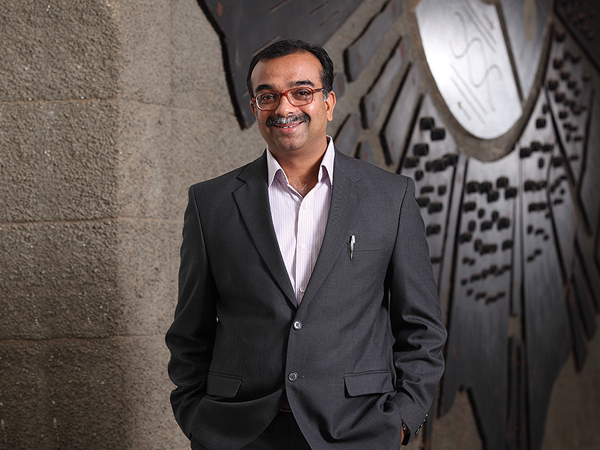
Engineering and Computer Science 2014
Jayant Haritsa
Professor, Supercomputer Education & Research Centre and Chair of Department of Computer Science & Automation, Indian Institute of Science (IISc), Bengaluru, India
Read More
Engineering and Computer Science 2013
V. Ramgopal Rao
Professor of Nanotechnology, Indian Institute of Technology, Bombay
Read More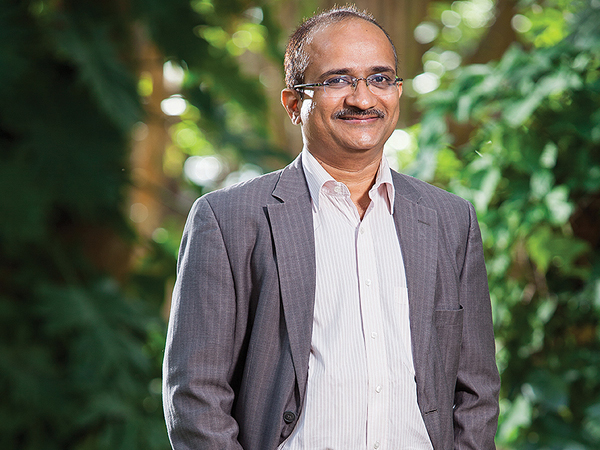
Engineering and Computer Science 2012
Ashish Lele
Scientist at the National Chemical Laboratories (NCL), Pune
Read More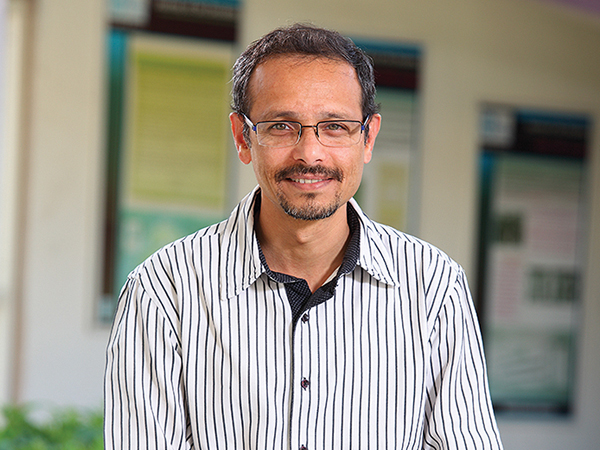
Engineering and Computer Science 2011
Kalyanmoy Deb
Koenig Endowed Chair Professor, Department of Electrical & Computer Engineering, Professor of Computer Science & Engineering, Professor of Mechanical Engineering, Michigan State University, USA
Read More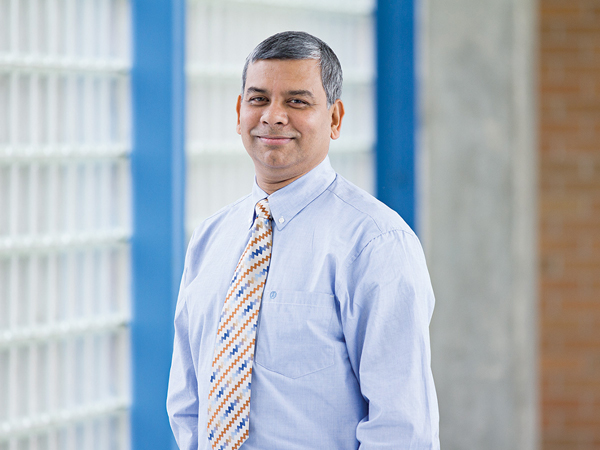
Engineering and Computer Science 2010
Ashutosh Sharma
Institute Chair, Professor and Principal Investigator, Center of Nanosciences, Indian Institute of Technology, Kanpur
Read More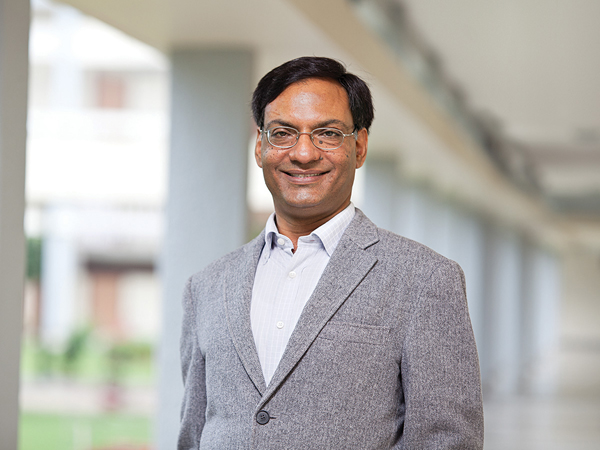
Jury
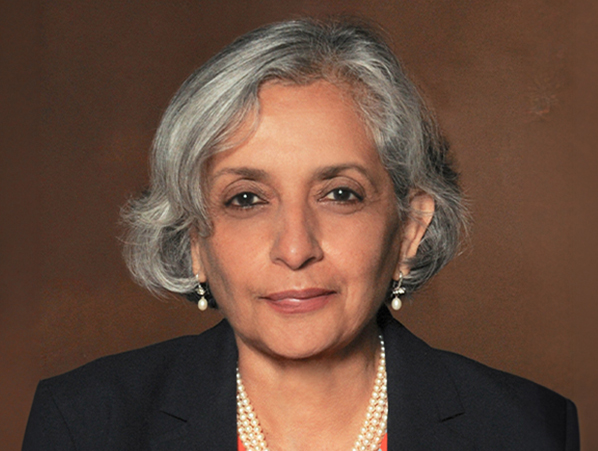
Jayathi Y. Murthy
President, Oregon State University
View More
Jayathi Y. Murthy
President, Oregon State University
View More
Arvind
Johnson Professor of Computer Science and Engineering, Computer Science and Artificial Intelligence Laboratory, Massachusetts Institute of Technology
View More
Prof. Arvind
Johnson Professor of Computer Science and Engineering, Head Computer Science Faculty, Schwarzman College of Computing, Massachusetts Institute of Technology
View More
Prof. Arvind
Johnson Professor of Computer Science and Engineering, Head Computer Science Faculty, Schwarzman College of Computing, Massachusetts Institute of Technology
View More
Arvind
Johnson Professor of Computer Science and Engineering, Computer Science and Artificial Intelligence Laboratory, Massachusetts Institute of Technology
View More
Prof. Arvind
Johnson Professor of Computer Science and Engineering, Computer Science and Artificial Intelligence Laboratory, Massachusetts Institute of Technology
View More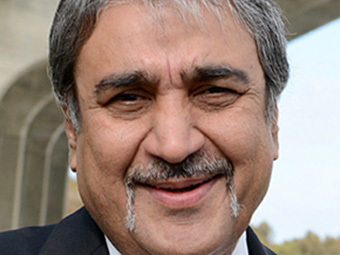
Prof. Pradeep K. Khosla
Chancellor, University of California, San Diego, USA
View More
Prof. Pradeep K. Khosla
Chancellor, University of California, San Diego, USA
View More
Prof. Pradeep K. Khosla
Chancellor, University of California, San Diego, USA
View More
Pradeep K. Khosla
Chancellor, University of California, San Diego, USA
View More
Prof. Pradeep K. Khosla
Chancellor, University of California, San Diego, USA
View More
Pradeep K. Khosla
Chancellor, University of California, San Diego, USA
View More
Pradeep K. Khosla
Chancellor, University of California, San Diego, USA
View More
Pradeep K. Khosla
Dean of the College of Engineering, and the Philip and Mar¬sha Dowd University Professor at Carnegie Mellon University, USA
View More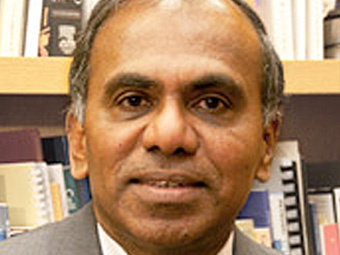
Prof. Subra Suresh
Dean of the School of Engineering and Vannevar Bush Professor of Engineering at Massachusetts Institute of Technology, USA
View More
Prof. Subra Suresh
Dean of the School of Engineering and Vannevar Bush Professor of Engineering at Massachusetts Institute of Technology, USA
View MoreEngineering and Computer Science 2025
President Jayathi Y. Murthy, a national leader in higher education engineering teaching, research and service, began her service as Oregon State University’s 16th president on September 9, 2022.
As OSU’s president, Murthy is committed to improving access to college for all learners; advancing student success, undergraduate graduation rates and inclusive excellence throughout the university; expanding OSU’s strong research portfolio by investing in research infrastructure; and supporting faculty excellence in teaching, scholarship, research, and Extension and engagement programs.
Prior to joining Oregon State, Murthy served as the first woman dean of the UCLA Henry Samueli School of Engineering and Applied Science from January 2016. During her tenure, she made expanding access to a UCLA engineering education a top priority by deepening relationships with local community colleges, increasing outreach to underrepresented minority groups and easing the transition for transfer students. She led the effort to establish Women in Engineering at UCLA – a program that supports the full participation of women in engineering. While at UCLA, she was active in helping raise more than $330 million in philanthropy.
Jayathi Murthy also served as chair of the mechanical engineering department at the University of Texas at Austin from 2012-2015; worked as a mechanical engineering professor at Purdue University from 2001-2011; and served as a professor of mechanical engineering at Carnegie Mellon University in Pittsburgh from 1998 to 2001. Murthy began her academic career at Arizona State University in 1984. From 1988 to 1998, Murthy worked at New Hampshire-based Fluent, Inc., a developer and vendor of the world’s most widely used computational fluid dynamics software. She led the development of algorithms and software that still form the core of the company’s products.
Murthy’s research interests include nanoscale heat transfer, computational fluid dynamics, and simulations of fluid flow and heat transfer for industrial applications. Recently, her focus is on sub-micron thermal transport, multiscale multi-physics simulations of micro- and nano-electromechanical systems (MEMS and NEMS) and the uncertainty quantifications involved in those systems. She has authored over 330 technical publications.
She is a member of the National Academy of Engineering (NAE), foreign fellow of the Indian National Academy of Engineering (INAE), fellow of the American Society of Mechanical Engineers (ASME) and the recipient of many honors, including the ASME Heat Transfer Memorial Award in 2016, the ASME Electronics and Photonics Packaging Division Clock Award, and ASME Kate Gleason Award in 2023.
Murthy received a doctorate in mechanical engineering from the University of Minnesota, a master’s degree in mechanical engineering from Washington State University and a bachelor’s degree in mechanical engineering from the Indian Institute of Technology, Kanpur, where she was named a distinguished alumna in 2012.
Dr. Dhananjaya Dendukuri is the Chief Executive Officer and Co-Founder of Achira Labs. He returned to India driven by his passion for engineering and the belief that technology development for underserved markets must be done locally. Achira is a pioneering Indian company translating cutting-edge microfluidics technologies into industrial practice for medical devices and diagnostics. The company has built India’s first microfluidics-based platform for point-of-care immunodiagnostics and created the world’s first woven-fabric-based point-of-care platform. Achira develops products for a range of diagnostic applications, including infectious diseases and metabolic health.
Dr. Dendukuri’s research and entrepreneurial work are backed by over 30 international patents, several peer-reviewed publications and national and international government-funded projects. Research at Achira is supported by prominent partners including Cipla, Catamaran, the Bill & Melinda Gates Foundation (BMGF), and the Biotechnology Industry Research Assistance Council (BIRAC). He has been recognized with several honors, including the MIT Technology Review’s TR35 Award, the National Technology Award for New Technologies, and is an elected Fellow of the Indian National Academy of Engineering.
He holds a Ph.D. in Chemical Engineering from the Massachusetts Institute of Technology (MIT), an M.A.Sc. in Chemical Engineering from the University of Toronto, and a B.Tech. in Chemical Engineering from the Indian Institute of Technology, Madras, where he received the Institute Blue.
Vikram Deshpande obtained his B.Tech. from the Indian Institute of Technology, Bombay and Ph.D. from the University of Cambridge. He is currently professor of Materials Engineering at the University of Cambridge. He has also served on the faculty at the University of California, Santa Barbara and the Technical University of Eindhoven.
Vikram Deshpande is an engineer who specializes in materials engineering and is the editor-in-chief of the Journal of the Mechanics and Physics of Solids. He specialises in developing mechanics-based models of sophisticated structural materials and of soft, active materials by combining theoretical understanding with insightful experiments to unravel complex phenomena. Examples his work range from dislocation-based modelling of crystalline materials, the development of new micro-architectured materials to the role of entropic forces in cell mechano-transduction.
His recognitions include the 2020 Rodney Hill Prize in Solid Mechanics, the 2022 Prager Medal, the 2022 ASME Koiter Medal, the 2024 Bazant Medal ASCE, the 2025 EUROMECH solid mechanics prize and the 2025 ASME Nadai Medal. He has been elected Fellow of the Royal Society London, the UK Royal Academy of Engineering, Member of Academia Europaea, and an International Member of the US National Academy of Engineering (NAE).
Sunita Sarawagi is the Institute Chair Professor of the Computer Science and Engineering department at the Indian Institute of Technology, Bombay. She obtained her B.Tech. from IIT-Kharagpur and her Ph.D. from the University of California, Berkeley. She has worked at Google Research US (2014-2016), CMU (2004), and IBM Almaden Research Center (1996-1999). She is the Infosys Prize 2019 laureate in Engineering and Computer Science for her research in databases, data mining, machine learning and natural language processing, and for important applications of these research techniques. She is an ACM fellow and was awarded distinguished Alumnus from IIT Kharagpur in 2019.
Rajesh K. Gupta is Dean of the School of Computing, Information and Data Science at UC San Diego. He served as the founding director of the Halıcıoğlu Data Science Institute (HDSI) and Chair of the Computer Science and Engineering department, where he is currently a distinguished professor. Professor Gupta's research focuses on embedded and cyber-physical systems, with a particular emphasis on sensor data organization and its applications in optimization and analytics. His publications and patents span various aspects of systems design, design automation, clock design, data-path synthesis, system-on-chip modeling, and dynamic power management. He is a Co-Principal Investigator (Co-PI) in the DARPA/SRC JUMP ACE Center on Evolvable Computing and the NSF-sponsored DERConnect for Distributed Energy Resources. A distinguished alumnus of IIT Kanpur, Gupta received an MS from UC Berkeley and a PhD in Electrical Engineering from Stanford University. Prof. Gupta holds Qualcomm Endowed Chair in Embedded Microsystems at UC San Diego and INRIA International Chair at the French international research institute in Rennes, Bretagne Atlantique. He is a Fellow of the IEEE, the ACM, and the American Association for the Advancement of Science (AAAS).
Umesh K. Mishra is the Richard A. Auhll Dean of The Robert Mehrabian College of Engineering, and the Donald W. Whittier Distinguished Professor of Electrical and Computer Engineering at UC Santa Barbara. He received his B.Tech from the Indian Institute of Technology in Kanpur, India, his M.S from Lehigh University in Bethlehem, PA., and his Ph.D. in 1984 from Cornell University in Ithaca, NY. He co-founded the first start-up in the world to commercialize RF GaN transistors and LEDs in 1996 (Nitres) which was acquired by CREE (now Wolfspeed) in 2000. Umesh co-founded Transphorm in 2007 to commercialize GaN transistors for power conversion which was acquired by Renesas in 2024. Umesh has advised 82 PhD theses to completion and his students are leaders in academia and industry. He is a Fellow of the IEEE, an International Fellow of the Japanese Society of Applied Physics, a Fellow of the National Academy of Inventors, a Member of the National Academy of Engineering, a Foreign Fellow of the Indian National Academy of Engineering and a Distinguished Alumnus of IIT Kanpur. He has received several awards for developing GaN electronics including the IEEE Jun-Ichi Nishizawa Medal in 2022.
Engineering and Computer Science 2024
President Jayathi Y. Murthy, a national leader in higher education engineering teaching, research and service, began her service as Oregon State University’s 16th president on September 9, 2022.
As OSU’s president, Murthy is committed to improving access to college for all learners; advancing student success, undergraduate graduation rates and inclusive excellence throughout the university; expanding OSU’s strong research portfolio by investing in research infrastructure; and supporting faculty excellence in teaching, scholarship, research, and Extension and engagement programs.
Prior to joining Oregon State, Murthy served as the first woman dean of the UCLA Henry Samueli School of Engineering and Applied Science from January 2016. During her tenure, she made expanding access to a UCLA engineering education a top priority by deepening relationships with local community colleges, increasing outreach to underrepresented minority groups and easing the transition for transfer students. She led the effort to establish Women in Engineering at UCLA – a program that supports the full participation of women in engineering. While at UCLA, she was active in helping raise more than $330 million in philanthropy.
Jayathi Murthy also served as chair of the mechanical engineering department at the University of Texas at Austin from 2012-2015; worked as a mechanical engineering professor at Purdue University from 2001-2011; and served as a professor of mechanical engineering at Carnegie Mellon University in Pittsburgh from 1998 to 2001. Murthy began her academic career at Arizona State University in 1984. From 1988 to 1998, Murthy worked at New Hampshire-based Fluent, Inc., a developer and vendor of the world’s most widely used computational fluid dynamics software. She led the development of algorithms and software that still form the core of the company’s products.
Murthy’s research interests include nanoscale heat transfer, computational fluid dynamics, and simulations of fluid flow and heat transfer for industrial applications. Recently, her focus is on sub-micron thermal transport, multiscale multi-physics simulations of micro- and nano-electromechanical systems (MEMS and NEMS) and the uncertainty quantifications involved in those systems. She has authored over 330 technical publications.
She is a member of the National Academy of Engineering (NAE), foreign fellow of the Indian National Academy of Engineering (INAE), fellow of the American Society of Mechanical Engineers (ASME) and the recipient of many honors, including the ASME Heat Transfer Memorial Award in 2016, the ASME Electronics and Photonics Packaging Division Clock Award, and ASME Kate Gleason Award in 2023.
Murthy received a doctorate in mechanical engineering from the University of Minnesota, a master’s degree in mechanical engineering from Washington State University and a bachelor’s degree in mechanical engineering from the Indian Institute of Technology, Kanpur, where she was named a distinguished alumna in 2012.
Prof. Kaushik Bhattacharya received his B.Tech. degree from the Indian Institute of Technology, Madras in 1986, his Ph.D. from the University of Minnesota in 1991 and his post-doctoral training at the Courant Institute for Mathematical Sciences from 1991-1993. He joined Caltech in 1993. Prof. Bhattacharya has held visiting positions at Cornell University (1988); Heriot-Watt University in Scotland 1992); Max-Planck-Institute in Leipzig (1997-98); Isaac Newton Institute at the University of Cambridge (1999); Indian Institute of Science, Bangalore (2001); and the Jet Propulsion Laboratory (2006).
Kaushik Bhattacharya received the von Kármán Medal from the Society of Industrial and Applied Mathematics (2020); Distinguished Alumni Award of the Indian Institute of Technology, Madras (2019); the Outstanding Achievement Award of the University of Minnesota (2018); the Warner T. Koiter Medal of the American Society of Mechanical Engineering (2015); and the Graduate Student Council Teaching and Mentoring Award at Caltech (2013) amongst other distinctions. Prof. Bhattacharya was Editor of the Journal of the Mechanics and Physics of Solids (2004-2015), and currently serves on the editorial board of a number of archival publications. He has delivered numerous plenaries, keynotes and named lectures including the Midwest Mechanics Lecturer for 2006-07, Southwest Mechanics Lecturer for 2007-08 and Spanish Mechanics Lecturer in 2013. Prof. Bhattacharya has also served as consultant to a number of medical device companies.
Dr. Dhananjaya Dendukuri is Chief Executive Officer & Co-Founder of Achira Labs. Dr. Dendukuri returned to India with his passion for engineering and the belief that technology development for underserved markets must be done locally. Achira is a pioneering Indian company translating cutting-edge technologies in microfluidics to industrial practice in the area of medical devices and diagnostics. They have built India’s first microfluidics-based platform for point-of-care immunodiagnostics and also created the world’s first woven-fabric-based point-of-care platform. Achira makes products for a range of diagnostic applications including antibody and PCR tests for COVID-19. The research output is backed by 24 issued international patents, several peer-reviewed publications, and seven national and international government-funded projects. Achira received the National Technology Award for New Technologies (Biotechnology) in 2016. Dr. Dendukuri was named as one of 20 individuals to receive the Massachusetts Institute of Technology’s (MIT’s) Technology Review’s prestigious TR35 awards in India for the work that was being done at Achira.
He received his Ph.D. in Chemical Engineering from MIT, MASC in Chemical Engineering from the University of Toronto and a B.Tech. in Chemical Engineering from the Indian Institute of Technology, Madras where he received the ‘Institute Blue’.
Ashutosh Sharma is Institute Chair Professor at the Department of Chemical Engineering, Indian Institute of Technology, Kanpur (IIT-K). He is also elected President of the Indian National Science Academy (2023-25), Chair of Science 20, S20/G20 in 2023 and Chair of Life Sciences Research Board of DRDO. He was Secretary to the Government of India heading its Department of Science and Technology (2015-21). In this position he helped initiate several new programs related to infrastructure and human capacity building; innovation and startups; R&D in advanced manufacturing, waste processing, clean energy, quantum technologies; and cyber-physical systems; industry-academia cooperation; science communication; women scientists; and major international collaborations in the areas of priority for the nation. Prof. Ashutosh Sharma was also Chairman of the boards of IISER Tirupati and IISER Berhampur and chaired the boards of Science and Engineering Research Board (SERB) and Technology Development Board (TDB). He is currently Chairman of International Advanced Research Centre for Powder Metallurgy and New Materials (ARCI, a DST Instituion), Hyderabad and of CSIR-CGCRI, Kolkata.
With over 350 peer-reviewed articles and 15 filed patents, Prof. Sharma has made fundamental contributions to a highly interdisciplinary and wide range of fields in nanotechnology, thin polymer films, nanocomposites, and devices in energy, health, and environment; functional interfaces; micro/nano-mechanics of soft matter; nano-patterning and nanofabrication; colloid and interfacial engineering; biomaterials & bio surfaces; wetting and adhesion.
Ashutosh Sharma obtained a B.Tech. in Chemical Engineering from IIT-Kanpur in 1982, his M.S. degree from Penn State in 1984 and a Ph.D. from State University of New York at Buffalo in 1987, where he was a research faculty in ophthalmology until he joined Chemical Engineering at IIT-Kanpur in 1990. He became a full professor in 1997 and was the Head of Chemical Engineering (2003-06). He was the founding Coordinator of Nanosciences Center and Advanced Imaging Center at IIT-Kanpur.
Prof. Sharma has received numerous awards and honors including the inaugural Infosys Prize in Engineering and Computer Science, TWAS Science Prize of the World Academy of Sciences, Bessel Research Award of the Humboldt Foundation, J. C. Bose Fellowship, S. S. Bhatnagar Prize, Homi J. Bhabha Award of UGC, Syed Husain Zaheer Medal and the Meghnad Saha Medal of INSA, Distinguished Alumni Awards of IIT Kanpur and SUNY Buffalo, Firodia Award, the Life-time Achievement Award of the Indian Science Congress and several Doctor of Science honoris causa, including from SUNY Buffalo, and Jadavpur University.
Sharma is an elected Fellow of the Indian National Science Academy; Indian Academy of Sciences; The National Academy of Sciences, India; Indian National Academy of Engineering; The World Academy of Sciences (TWAS); and the Asia-Pacific Academy of Materials. He has also served on the councils of the first two. Prof. Sharma has been an associate editor of ACS Applied Materials and Interfaces since 2014, Proceedings of Indian National Science Academy and ASME Journal of Micro- and Nano-Manufacturing and has been on the editorial boards of several journals — Carbon; ACS Industrial and Engineering Chemistry Research; Current Science; Nanomaterials and Energy; Chemical Engineering Science; Journal of Colloid and Interface Science; Canadian Journal of Chemical Engineering; and Indian Chemical Engineer.
Sunita Sarawagi is the Institute Chair Professor of the Computer Science and Engineering department at the Indian Institute of Technology, Bombay. She obtained her B.Tech. from IIT-Kharagpur and her Ph.D. from the University of California, Berkeley. She has worked at Google Research US (2014-2016), CMU (2004), and IBM Almaden Research Center (1996-1999). She is the Infosys Prize 2019 laureate in Engineering and Computer Science for her research in databases, data mining, machine learning and natural language processing, and for important applications of these research techniques. She is an ACM fellow and was awarded distinguished Alumnus from IIT Kharagpur in 2019.
Engineering and Computer Science 2023
Prof. Arvind is a renowned Computer Scientist, whose work was instrumental in the development of dynamic dataflow architectures and associated parallel programming languages. Later he developed the Bluespec language for the synthesis and verification of large digital systems. The theoretical foundations of Bluespec are based on Guarded Atomic Actions.
After graduating with a B. Tech in Electrical Engineering from the Indian Institute of Technology, Kanpur (1969), Prof. Arvind went on to earn his M.S (1972) and Ph.D (1973), in Computer Science from the University of Minnesota. In 2000, he founded Sandburst, a fabless semiconductor company and in 2003, he co-founded Bluespec Inc, an EDA company.
Prof. Arvind has received numerous awards and honors and they include - IEEE Charles Babbage Outstanding Scientist Award (1994); Distinguished Alumnus Award, I.I.T. Kanpur (1999); Distinguished Alumnus Award, University of Minnesota, Outstanding Achievement Award, University of Minnesota (2008); and the IEEE Computer Society Harry H. Goode Memorial Award (2012).
Ashutosh Sharma is Institute Chair Professor at the Department of Chemical Engineering, Indian Institute of Technology, Kanpur (IIT-K). He is also elected President of the Indian National Science Academy (2023-25), Chair of Science 20, S20/G20 in 2023 and Chair of Life Sciences Research Board of DRDO. He was Secretary to the Government of India heading its Department of Science and Technology (2015-21). In this position he helped initiate several new programs related to infrastructure and human capacity building; innovation and startups; R&D in advanced manufacturing, waste processing, clean energy, quantum technologies; and cyber-physical systems; industry-academia cooperation; science communication; women scientists; and major international collaborations in the areas of priority for the nation. Prof. Ashutosh Sharma was also Chairman of the boards of IISER Tirupati and IISER Berhampur and chaired the boards of Science and Engineering Research Board (SERB) and Technology Development Board (TDB).
With over 350 peer-reviewed articles and 15 filed patents, Prof. Sharma has made fundamental contributions to a highly interdisciplinary and wide range of fields in nanotechnology, thin polymer films, nanocomposites, and devices in energy, health, and environment; functional interfaces; micro/nano-mechanics of soft matter; nano-patterning and nanofabrication; colloid and interfacial engineering; biomaterials & bio surfaces; wetting and adhesion.
Ashutosh Sharma obtained a B.Tech. in Chemical Engineering from IIT-Kanpur in 1982, his M.S. degree from Penn State in 1984 and a Ph.D. from State University of New York at Buffalo in 1987, where he was a research faculty in ophthalmology until he joined Chemical Engineering at IIT-Kanpur in 1990. He became a full professor in 1997 and was the Head of Chemical Engineering (2003-06). He was the founding Coordinator of Nanosciences Center and Advanced Imaging Center at IIT-Kanpur.
Prof. Sharma has received numerous awards and honors including the inaugural Infosys Prize in Engineering and Computer Science, TWAS Science Prize of the World Academy of Sciences, Bessel Research Award of the Humboldt Foundation, J. C. Bose Fellowship, S. S. Bhatnagar Prize, Homi J. Bhabha Award of UGC, Syed Husain Zaheer Medal and the Meghnad Saha Medal of INSA, Distinguished Alumni Awards of IIT Kanpur and SUNY Buffalo, Firodia Award, the Life-time Achievement Award of the Indian Science Congress and several Doctor of Science honoris causa, including from SUNY Buffalo, and Jadavpur University.
Sharma is an elected Fellow of the Indian National Science Academy; Indian Academy of Sciences; The National Academy of Sciences, India; Indian National Academy of Engineering; The World Academy of Sciences (TWAS); and the Asia-Pacific Academy of Materials. He has also served on the councils of the first two. Prof. Sharma has been an associate editor of ACS Applied Materials and Interfaces since 2014, Proceedings of Indian National Science Academy and ASME Journal of Micro- and Nano-Manufacturing and has been on the editorial boards of several journals—Carbon; ACS Industrial and Engineering Chemistry Research; Current Science; Nanomaterials and Energy; Chemical Engineering Science; Journal of Colloid and Interface Science; Canadian Journal of Chemical Engineering; and Indian Chemical Engineer.
Prof. Kaushik Bhattacharya received his B.Tech. degree from the Indian Institute of Technology, Madras in 1986, his Ph.D. from the University of Minnesota in 1991 and his post-doctoral training at the Courant Institute for Mathematical Sciences from 1991-1993. He joined Caltech in 1993. Prof. Bhattacharya has held visiting positions at Cornell University (1988); Heriot-Watt University in Scotland 1992); Max-Planck-Institute in Leipzig (1997-98); Isaac Newton Institute at the University of Cambridge (1999); Indian Institute of Science, Bangalore (2001); and the Jet Propulsion Laboratory (2006).
Kaushik Bhattacharya received the von Kármán Medal from the Society of Industrial and Applied Mathematics (2020); Distinguished Alumni Award of the Indian Institute of Technology, Madras (2019); the Outstanding Achievement Award of the University of Minnesota (2018); the Warner T. Koiter Medal of the American Society of Mechanical Engineering (2015); and the Graduate Student Council Teaching and Mentoring Award at Caltech (2013) amongst other distinctions. Prof. Bhattacharya was Editor of the Journal of the Mechanics and Physics of Solids (2004-2015), and currently serves on the editorial board of a number of archival publications. He has delivered numerous plenaries, keynotes and named lectures including the Midwest Mechanics Lecturer for 2006-07, Southwest Mechanics Lecturer for 2007-08 and Spanish Mechanics Lecturer in 2013. Prof. Bhattacharya has also served as consultant to a number of medical device companies.
Dr. Dhananjaya Dendukuri is Chief Executive Officer & Co-Founder of Achira Labs. Dr. Dendukuri returned to India with his passion for engineering and the belief that technology development for underserved markets must be done locally. Achira is a pioneering Indian company translating cutting-edge technologies in microfluidics to industrial practice in the area of medical devices and diagnostics. They have built India’s first microfluidics-based platform for point-of-care immunodiagnostics and also created the world’s first woven-fabric-based point-of-care platform. Achira makes products for a range of diagnostic applications including antibody and PCR tests for COVID-19. The research output is backed by 24 issued international patents, several peer-reviewed publications, and seven national and international government-funded projects. Achira received the National Technology Award for New Technologies (Biotechnology) in 2016. Dr. Dendukuri was named as one of 20 individuals to receive the Massachusetts Institute of Technology’s (MIT’s) Technology Review’s prestigious TR35 awards in India for the work that was being done at Achira. He received his Ph.D. in Chemical Engineering from MIT, MASC in Chemical Engineering from the University of Toronto and a B.Tech. in Chemical Engineering from the Indian Institute of Technology, Madras where he received the ‘Institute Blue’.
President Jayathi Y. Murthy, a national leader in higher education engineering teaching, research and service, began her service as Oregon State University’s 16th president on September 9, 2022.
As OSU’s president, Murthy is committed to improving access to college for all learners; advancing student success, undergraduate graduation rates and inclusive excellence throughout the university; expanding OSU’s strong research portfolio by investing in research infrastructure; and supporting faculty excellence in teaching, scholarship, research, and Extension and engagement programs.
Prior to joining Oregon State, Murthy served as the first woman dean of the UCLA Henry Samueli School of Engineering and Applied Science from January 2016. During her tenure, she made expanding access to a UCLA engineering education a top priority by deepening relationships with local community colleges, increasing outreach to underrepresented minority groups and easing the transition for transfer students. She led the effort to establish Women in Engineering at UCLA – a program that supports the full participation of women in engineering. While at UCLA, she was active in helping raise more than $330 million in philanthropy.
Jayathi Murthy also served as chair of the mechanical engineering department at the University of Texas at Austin from 2012-2015; worked as a mechanical engineering professor at Purdue University from 2001-2011; and served as a professor of mechanical engineering at Carnegie Mellon University in Pittsburgh from 1998 to 2001. Murthy began her academic career at Arizona State University in 1984. From 1988 to 1998, Murthy worked at New Hampshire-based Fluent, Inc., a developer and vendor of the world’s most widely used computational fluid dynamics software. She led the development of algorithms and software that still form the core of the company’s products.
Murthy’s research interests include nanoscale heat transfer, computational fluid dynamics, and simulations of fluid flow and heat transfer for industrial applications. Recently, her focus is on sub-micron thermal transport, multiscale multi-physics simulations of micro- and nano-electromechanical systems (MEMS and NEMS) and the uncertainty quantifications involved in those systems. She has authored over 330 technical publications.
She is a member of the National Academy of Engineering (NAE), foreign fellow of the Indian National Academy of Engineering (INAE), fellow of the American Society of Mechanical Engineers (ASME) and the recipient of many honors, including the ASME Heat Transfer Memorial Award in 2016, the ASME Electronics and Photonics Packaging Division Clock Award, and ASME Kate Gleason Award in 2023.
Murthy received a doctorate in mechanical engineering from the University of Minnesota, a master’s degree in mechanical engineering from Washington State University and a bachelor’s degree in mechanical engineering from the Indian Institute of Technology, Kanpur, where she was named a distinguished alumna in 2012.
Sunita Sarawagi is the Institute Chair Professor of the Computer Science and Engineering department at the Indian Institute of Technology, Bombay. After obtaining her B.Tech. from IIT-Kharagpur and her Ph.D. from the University of California, Berkeley, Prof. Sunita Sarawagi joined IIT-Bombay. Prof. Sarawagi was one of the first researchers to develop information extraction techniques that went beyond the world of structured databases to unstructured data. Prof. Sarawagi was a Visiting Scientist at Google Inc. from 2014 to 2016, where she worked on deep learning models for personalizing and diversifying YouTube and Play recommendations, improving a conversation assistance engine, and extracting attributes of classes from the Knowledge Graph. Sarawagi is the Infosys Prize 2019 laureate in Engineering and Computer Science for her research in databases, data mining, machine learning and natural language processing, and for important applications of these research techniques. Among Prof. Sarawagi’s many awards are Distinguished Alumni Award from IIT Kharagpur (2019), IBM Faculty award (2003 and 2008), and Fellow of the Indian National Academy of Engineering (INAE) (2013).
Engineering and Computer Science 2022
Prof. Arvind is a renowned computer scientist whose work has been instrumental in the development of dynamic dataflow architectures and associated parallel programming languages. Later he developed the Bluespec language for the synthesis and verification of large digital systems. The theoretical foundations of Bluespec are based on Guarded Atomic Actions.
After graduating with a B.Tech in Electrical Engineering from the Indian Institute of Technology, Kanpur (1969), Prof. Arvind went on to earn his M.S (1972) and Ph.D.(1973), in Computer Science from the University of Minnesota. In 2000, he founded Sandburst, a fabless semiconductor company and in 2003, he co-founded Bluespec Inc, an EDA company.
Prof. Arvind has received numerous awards and honors and they include - IEEE Charles Babbage Outstanding Scientist Award (1994); Distinguished Alumnus Award, I.I.T. Kanpur (1999); Distinguished Alumnus Award, University of Minnesota (2001), Outstanding Achievement Award, University of Minnesota (2008); and the IEEE Computer Society Harry H. Goode Memorial Award (2012). Prof. Arvind is a Fellow of IEEE (1994) and ACM (2006), and a member of the National Academy of Engineering (2008) and American Academy of Arts and Sciences (2012).
Prof. Jayathi Murthy was the Dean of the UCLA Henry Samueli School of Engineering and Applied Science at UCLA. She is currently President of Oregon State University.
Prof. Jayathi Y. Murthy has received a Ph.D. in mechanical engineering from the University of Minnesota, an M.S. from Washington State University and a B.Tech from the Indian Institute of Technology, Kanpur. She is a fellow of the American Society of Mechanical Engineers and the author of more than 280 technical publications. She serves on the editorial boards of Numerical Heat Transfer and the International Journal of Thermal Sciences.
Prof. Murthy is currently Ronald and Valerie Sugar Dean of the Henry Samueli School of Engineering and Applied Science at the University of California, Los Angeles. Prior to her appointment as dean, she served as department chair of the Mechanical Engineering department at The University of Texas at Austin, holding the Ernest Cockrell Jr. Memorial Chair in Engineering. She has also held faculty positions at Purdue University, Carnegie Mellon University and Arizona State University.
Her research interests include nanoscale heat transfer, computational fluid dynamics, and the Simulation of fluid flow and heat transfer for industrial applications.
Prof. Jitendra Malik received his B.Tech degree in Electrical Engineering from Indian Institute of Technology Kanpur in 1980, the Ph.D. degree in Computer Science from Stanford University in 1985, and joined UC Berkeley as a faculty member in 1986, where he has also served as Department Chair. Prof. Malik's research interests include computer vision, machine learning, artificial intelligence, robotics and computer graphics. He has been elected to the US National Academy of Sciences, National Academy of Engineering and the American Academy of Arts and Sciences. Prof. Malik received the 2016 Allen Newell award from ACM and AAAI, the 2018 IJCAI Award for Research Excellence in AI, and in 2019 the IEEE Computer Society’s Computer Pioneer Award for his "leading role in developing Computer Vision into a thriving discipline through pioneering research, leadership, and mentorship".
Ashutosh Sharma is an Institute Chair Professor and C V Seshadri Chair Professor at the Department of chemical engineering, Indian Institute of Technology Kanpur (IITK). He served as the Secretary to the Government of India from 2015 to 2021 where he helped initiate several new programs related to infrastructure and human capacity building; innovation and startups; R&D in advanced manufacturing, waste processing, clean energy, and cyber-physical systems; industry-academia cooperation; science communication; women scientists; and major international collaborations in the areas of priority for the nation.
With over 350 peer-reviewed articles and 15 filed patents, Prof. Sharma has made fundamental contributions to a highly interdisciplinary and wide range of fields in nanotechnology, thin polymer films, nanocomposites, and devices in energy, health, and environment; functional interfaces; micro/nano-mechanics of soft matter; nano-patterning and nanofabrication; colloid and interfacial engineering; biomaterials & bio surfaces; wetting and adhesion.
Ashutosh Sharma obtained a Bachelor's degree in Chemical Engineering from IIT Kanpur in 1982, his M.S. degree from Penn State in 1984 and a Ph.D. from State University of New York at Buffalo in 1987, where he was a research faculty in ophthalmology until he joined Chemical Engineering at IIT-Kanpur in 1990. He became a full professor in 1997 and was the Head of Chemical Engineering (2003-06). He was the founding Coordinator of Nanosciences Center and Advanced Imaging Center at the Indian Institute of Technology at Kanpur,
Prof. Sharma has received numerous awards and honors including the inaugural Infosys Prize in Engineering and Computer Science, TWAS Science Prize of the World Academy of Sciences, Bessel Research Award of the Humboldt Foundation, J. C. Bose Fellowship, S. S. Bhatnagar Prize, Homi J. Bhabha Award of UGC, The Syed Husain Zaheer Medal and the Meghnad Saha Medal of INSA, Distinguished Alumni Awards of IIT Kanpur and SUNY Buffalo, Firodia Award, the Life-time Achievement Award of the Indian Science Congress and several Doctor of Science honoris causa, including from SUNY Buffalo, and Jadavpur University.
Prof. Sharma is an elected Fellow of The Indian National Science Academy, The Indian Academy of Sciences, The National Academy of Sciences, India and Indian National Academy of Engineering, The World Academy of Sciences (TWAS) and the Asia-Pacific Academy of Materials. He has also served on the Councils of the first two. He has been an associate editor of ACS Applied Materials and Interfaces, Proceedings of Indian National Science Academy and ASME Journal of Micro- and Nano-Manufacturing and has been on the editorial boards of several journals: Carbon; ACS Industrial and Engineering Chemistry Research; Current Science; Nanomaterials and Energy; Chemical Engineering Science; Journal of Colloid and Interface Science; Canadian Journal of Chemical Engineering and Indian Chemical Engineer.
Prof. Kaushik Bhattacharya received his B.Tech degree from the Indian Institute of Technology, Madras, India in 1986, his Ph.D from the University of Minnesota in 1991 and his post-doctoral training at the Courant Institute for Mathematical Sciences during 1991-1993. He joined Caltech in 1993. He has held visiting positions at Cornell University (1988), Heriot-Watt University in Scotland 1992), Max-Planck-Institute at Leipzig (1997-98), Isaac Newton Institute at the University of Cambridge (1999), Indian Institute of Science at Bangalore (2001) and the Jet Propulsion Laboratory (2006) and the University of Cambridge (2008-09). He has received the von Kármán Medal from the Society of Industrial and Applied Mathematics (2020), Distinguished Alumni Award of the Indian Institute of Technology, Madras (2019) the Outstanding Achievement Award of the University of Minnesota (2018), the Warner T. Koiter Medal of the American Society of Mechanical Engineering (2015) and the Graduate Student Council Teaching and Mentoring Award at Caltech (2013) amongst other distinctions. He was Editor of the Journal of the Mechanics and Physics of Solids (2004-2015), and currently serves on the editorial board of a number of archival publications. He has delivered numerous plenary, keynote and named lectures including the Midwest Mechanics Lecturer for 2006-07, Southwest Mechanics Lecturer for 2007-08 and Spanish Mechanics Lecturer in 2013. He has served as consultant to a number of medical device companies.
Dr. Dhananjaya Dendukuri is Chief Executive Officer & Co-Founder of Achira Labs. Dr. Dendukuri returned to India with his passion for engineering and the belief that technology development for underserved markets must be done locally. Achira is a pioneering Indian company translating cutting-edge technologies in microfluidics to industrial practice in the area of medical devices and diagnostics. They have built India’s first microfluidics-based platform for point-of-care immunodiagnostics and also created the world’s first woven-fabric-based point-of-care platform. Achira makes products for a range of diagnostic applications including antibody and PCR tests for COVID19. The research output is backed by 24 issued international patents, several peer-reviewed publications, and 7 national and international government-funded projects. Achira received the National Technology Award for new technologies (biotechnology) in 2016. Dr. Dendukuri was named as one of 20 individuals to receive the Massachusetts Institute of Technology’s (MIT’s) Technology Review’s prestigious TR35 awards in India for the work that was being done at Achira. He received his Ph.D. in Chemical Engineering from MIT, an MASC in Chemical Engineering from the University of Toronto and a B.Tech in Chemical Engineering from the Indian Institute of Technology, Madras where he received the ‘Institute Blue’.
Engineering and Computer Science 2021
Prof. Arvind is a renowned computer scientist whose work has been instrumental in the development of dynamic dataflow architectures and associated parallel programming languages. Later he developed the Bluespec language for the synthesis and verification of large digital systems. The theoretical foundations of Bluespec are based on Guarded Atomic Actions.
After graduating with a B.Tech in Electrical Engineering from the Indian Institute of Technology, Kanpur (1969), Prof. Arvind went on to earn his M.S (1972) and Ph.D.(1973), in Computer Science from the University of Minnesota. In 2000, he founded Sandburst, a fabless semiconductor company and in 2003, he co-founded Bluespec Inc, an EDA company.
Prof. Arvind has received numerous awards and honors and they include - IEEE Charles Babbage Outstanding Scientist Award (1994); Distinguished Alumnus Award, I.I.T. Kanpur (1999); Distinguished Alumnus Award, University of Minnesota (2001), Outstanding Achievement Award, University of Minnesota (2008); and the IEEE Computer Society Harry H. Goode Memorial Award (2012). Prof. Arvind is a Fellow of IEEE (1994) and ACM (2006), and a member of the National Academy of Engineering (2008) and American Academy of Arts and Sciences (2012).
Prof. Jayathi Y. Murthy has received a Ph.D. in mechanical engineering from the University of Minnesota, an M.S. from Washington State University and a B.Tech from the Indian Institute of Technology, Kanpur. She is a fellow of the American Society of Mechanical Engineers and the author of more than 280 technical publications. She serves on the editorial boards of Numerical Heat Transfer and the International Journal of Thermal Sciences.
Prof. Murthy is currently Ronald and Valerie Sugar Dean of the Henry Samueli School of Engineering and Applied Science at the University of California, Los Angeles. Prior to her appointment as dean, she served as department chair of the Mechanical Engineering department at The University of Texas at Austin, holding the Ernest Cockrell Jr. Memorial Chair in Engineering. She has also held faculty positions at Purdue University, Carnegie Mellon University and Arizona State University.
Her research interests include nanoscale heat transfer, computational fluid dynamics, and the Simulation of fluid flow and heat transfer for industrial applications.
Prof. Jitendra Malik received his B.Tech degree in Electrical Engineering from Indian Institute of Technology Kanpur in 1980, the Ph.D. degree in Computer Science from Stanford University in 1985, and joined UC Berkeley as a faculty member in 1986, where he has also served as Department Chair. Prof. Malik's research interests include computer vision, machine learning, artificial intelligence, robotics and computer graphics. He has been elected to the US National Academy of Sciences, National Academy of Engineering and the American Academy of Arts and Sciences. Prof. Malik received the 2016 Allen Newell award from ACM and AAAI, the 2018 IJCAI Award for Research Excellence in AI, and in 2019 the IEEE Computer Society’s Computer Pioneer Award for his "leading role in developing Computer Vision into a thriving discipline through pioneering research, leadership, and mentorship".
Prof. Sudhir K Jain is currently serving his third term as director of the Indian Institute of Technology Gandhinagar, which he joined as founder director in June 2009. He was on the faculty of IIT Kanpur for 35 years from 1984-2019. Dr Jain is an internationally reputed scholar of earthquake engineering and a passionate academic administrator. He holds a Bachelor of Engineering from the University of Roorkee, and Masters and Doctoral degrees from the California Institute of Technology, Pasadena. He served as President of the International Association for Earthquake Engineering from 2014-18. He was elected Fellow of the Indian National Academy of Engineering in 2003, and International Member of the US National Academy of Engineering in 2021. He was conferred the Padma Shri by the Government of India in 2020.
Prof. Kaushik Bhattacharya received his B.Tech degree from the Indian Institute of Technology, Madras, India in 1986, his Ph.D from the University of Minnesota in 1991 and his post-doctoral training at the Courant Institute for Mathematical Sciences during 1991-1993. He joined Caltech in 1993. He has held visiting positions at Cornell University (1988), Heriot-Watt University in Scotland 1992), Max-Planck-Institute at Leipzig (1997-98), Isaac Newton Institute at the University of Cambridge (1999), Indian Institute of Science at Bangalore (2001) and the Jet Propulsion Laboratory (2006) and the University of Cambridge (2008-09). He has received the von Kármán Medal from the Society of Industrial and Applied Mathematics (2020), Distinguished Alumni Award of the Indian Institute of Technology, Madras (2019) the Outstanding Achievement Award of the University of Minnesota (2018), the Warner T. Koiter Medal of the American Society of Mechanical Engineering (2015) and the Graduate Student Council Teaching and Mentoring Award at Caltech (2013) amongst other distinctions. He was Editor of the Journal of the Mechanics and Physics of Solids (2004-2015), and currently serves on the editorial board of a number of archival publications. He has delivered numerous plenary, keynote and named lectures including the Midwest Mechanics Lecturer for 2006-07, Southwest Mechanics Lecturer for 2007-08 and Spanish Mechanics Lecturer in 2013. He has served as consultant to a number of medical device companies.
Dr. Dhananjaya Dendukuri is Chief Executive Officer & Co-Founder of Achira Labs. Dr. Dendukuri returned to India with his passion for engineering and the belief that technology development for underserved markets must be done locally. Achira is a pioneering Indian company translating cutting-edge technologies in microfluidics to industrial practice in the area of medical devices and diagnostics. They have built India’s first microfluidics-based platform for point-of-care immunodiagnostics and also created the world’s first woven-fabric-based point-of-care platform. Achira makes products for a range of diagnostic applications including antibody and PCR tests for COVID19. The research output is backed by 24 issued international patents, several peer-reviewed publications, and 7 national and international government-funded projects. Achira received the National Technology Award for new technologies (biotechnology) in 2016. Dr. Dendukuri was named as one of 20 individuals to receive the Massachusetts Institute of Technology’s (MIT’s) Technology Review’s prestigious TR35 awards in India for the work that was being done at Achira. He received his Ph.D. in Chemical Engineering from MIT, an MASC in Chemical Engineering from the University of Toronto and a B.Tech in Chemical Engineering from the Indian Institute of Technology, Madras where he received the ‘Institute Blue’.
Engineering and Computer Science 2020
Prof. Arvind is a renowned Computer Scientist, whose work was instrumental in the development of dynamic dataflow architectures and associated parallel programming languages. Later he developed the Bluespec language for the synthesis and verification of large digital systems. The theoretical foundations of Bluespec are based on Guarded Atomic Actions.
After graduating with a B. Tech in Electrical Engineering from the Indian Institute of Technology, Kanpur (1969), Prof. Arvind went on to earn his M.S (1972) and Ph.D (1973), in Computer Science from the University of Minnesota. In 2000, he founded Sandburst, a fabless semiconductor company and in 2003, he co-founded Bluespec Inc, an EDA company.
Prof. Arvind has received numerous awards and honors and they include - IEEE Charles Babbage Outstanding Scientist Award (1994); Distinguished Alumnus Award, I.I.T. Kanpur (1999); Distinguished Alumnus Award, University of Minnesota, Outstanding Achievement Award, University of Minnesota (2008); and the IEEE Computer Society Harry H. Goode Memorial Award (2012).
Prof. Jayathi Y. Murthy has received a Ph.D. in mechanical engineering from the University of Minnesota, an M.S. from Washington State University and a B.Tech from the Indian Institute of Technology, Kanpur. She is a fellow of the American Society of Mechanical Engineers and the author of more than 280 technical publications. She serves on the editorial boards of Numerical Heat Transfer and the International Journal of Thermal Sciences.
Prof. Murthy is currently Ronald and Valerie Sugar Dean of the Henry Samueli School of Engineering and Applied Science at the University of California, Los Angeles. Prior to her appointment as dean, she served as department chair of the Mechanical Engineering department at The University of Texas at Austin, holding the Ernest Cockrell Jr. Memorial Chair in Engineering. She has also held faculty positions at Purdue University, Carnegie Mellon University and Arizona State University.
Her research interests include nanoscale heat transfer, computational fluid dynamics, and the Simulation of fluid flow and heat transfer for industrial applications.
Prof. Jitendra Malik received his B.Tech degree in Electrical Engineering from Indian Institute of Technology Kanpur in 1980, the Ph.D. degree in Computer Science from Stanford University in 1985, and joined UC Berkeley as a faculty member in 1986, where he has also served as Department Chair. Prof. Malik's research interests include computer vision, machine learning, artificial intelligence, robotics and computer graphics. He has been elected to the US National Academy of Sciences, National Academy of Engineering and the American Academy of Arts and Sciences. Prof. Malik received the 2016 Allen Newell award from ACM and AAAI, the 2018 IJCAI Award for Research Excellence in AI, and in 2019 the IEEE Computer Society’s Computer Pioneer Award for his "leading role in developing Computer Vision into a thriving discipline through pioneering research, leadership, and mentorship".
Dr. Sudhir Jain is currently serving his third term as director of the Indian Institute of Technology Gandhinagar, which he joined as founder director in June 2009. He was on the faculty of IIT Kanpur for 35 years from 1984-2019. Dr. Jain is an internationally reputed scholar of earthquake engineering and a passionate academic administrator. He holds a Bachelor of Engineering from the University of Roorkee, and Masters and Doctoral degrees from the California Institute of Technology, Pasadena. He served as President of the International Association for Earthquake Engineering from 2014-18. He was elected Fellow of the Indian National Academy of Engineering in 2003, and conferred Padma Shri by the Government of India in 2020.
Under Dr. Jain's leadership, IITGN has introduced numerous innovations in curriculum, student affairs, faculty recruitment and institutional management to inculcate and promote excellence by faculty and students. He led the development of IITGN's new campus, which has won several national awards and is the first campus in India to receive the 5-star GRIHA-LD rating.
Dr. Jain has made major contributions to earthquake engineering practice and education in India. He was instrumental in the development of several important seismic codes in India, and has trained thousands of professional engineers and college teachers in earthquake engineering. He established the National Information Centre of Earthquake Engineering (NICEE) at IITK and developed the National Programme on Earthquake Engineering Education (NPEEE), supported by the Government of India. Dr. Jain has served as seismic consultant for major projects, such as bridges and petrochemical pipelines; and has published more than 150 scholarly papers. His research interests include the study of damaging earthquakes, reinforced concrete buildings, bridges, and seismic codes.
Prof. Kaushik Bhattacharya received his B.Tech degree from the Indian Institute of Technology, Madras, India in 1986, his Ph.D from the University of Minnesota in 1991 and his post-doctoral training at the Courant Institute for Mathematical Sciences during 1991-1993. He joined Caltech in 1993. He has held visiting positions at Cornell University (1988), Heriot-Watt University in Scotland 1992), Max-Planck-Institute at Leipzig (1997-98), Isaac Newton Institute at the University of Cambridge (1999), Indian Institute of Science at Bangalore (2001) and the Jet Propulsion Laboratory (2006) and the University of Cambridge (2008-09). He has received the von Kármán Medal from the Society of Industrial and Applied Mathematics (2020), Distinguished Alumni Award of the Indian Institute of Technology, Madras (2019) the Outstanding Achievement Award of the University of Minnesota (2018), the Warner T. Koiter Medal of the American Society of Mechanical Engineering (2015) and the Graduate Student Council Teaching and Mentoring Award at Caltech (2013) amongst other distinctions. He was Editor of the Journal of the Mechanics and Physics of Solids (2004-2015), and currently serves on the editorial board of a number of archival publications. He has delivered numerous plenary, keynote and named lectures including the Midwest Mechanics Lecturer for 2006-07, Southwest Mechanics Lecturer for 2007-08 and Spanish Mechanics Lecturer in 2013. He has served as consultant to a number of medical device companies.
Dr. Dhananjaya Dendukuri is Chief Executive Officer & Co-Founder of Achira Labs. Dr. Dendukuri returned to India with his passion for engineering and the belief that technology development for underserved markets must be done locally. Achira is a pioneering Indian company translating cutting edge technologies in microfluidics to industrial practice in the area of medical devices and diagnostics. They have built India’s first microfluidics-based platform for point-of-care diagnostics and also created the world’s first woven-fabric based point-of-care platform. The research output is backed by 24 issued international patents, several peer-reviewed publications and 7 national and international government-funded projects. Achira received the National Technology Award for new technologies (biotechnology) in 2016.
Dr. Dendukuri was named as one of 20 individuals to receive the Massachusetts Institute of Technology’s (MIT’s) Technology Review’s prestigious TR35 awards in India for the work that was being done at Achira.
He received his Ph.D. in Chemical Engineering from MIT, an MASC in Chemical Engineering from the University of Toronto and a B.Tech in Chemical Engineering from the Indian Institute of Technology, Madras where he received the ‘Institute Blue’. Outside of work, Dr. Dendukuri enjoys running through the scenic parts of Bangalore and playing the Carnatic violin.
Engineering and Computer Science 2019
Prof. Arvind is a renowned Computer Scientist, whose work was instrumental in the development of dynamic dataflow architectures and associated parallel programming languages. Later he developed the Bluespec language for the synthesis and verification of large digital systems. The theoretical foundations of Bluespec are based on Guarded Atomic Actions.
After graduating with a B Tech in Electrical Engineering from the Indian Institute of Technology, Kanpur (1969), Prof. Arvind went on to earn his M.S (1972) and Ph.D (1973), in Computer Science from the University of Minnesota. In 2000, he founded Sandburst, a fabless semiconductor company and in 2003, he co-founded Bluespec Inc, an EDA company.
Prof. Arvind has received numerous awards and honors and they include - IEEE Charles Babbage Outstanding Scientist Award (1994); Distinguished Alumnus Award, I.I.T. Kanpur (1999); Distinguished Alumnus Award, University of Minnesota, Outstanding Achievement Award, University of Minnesota (2008); IEEE Computer Society Harry H. Goode Memorial Award (2012).
Kanianthra Mani Chandy received his B.Tech degree in 1965 from IIT Madras. He got is Masters in Electrical Engineering in 1966 from New York University, and his PhD from the Massachusetts Institute of Technology in 1969 in Operations Research. He worked at Honeywell and IBM and taught in the Computer Science Department at the University of Texas at Austin from 1970 to 1987 where he was the Regents Chair Professor and also served as the chair of the CS department. He was at the Computer Science Department at the California Institute of Technology from 1987 to 2014 where he was the Simon Ramo Chair, and is now an Emeritus Professor.
He received the A. A. Michelson Award in 1985 and the IEEE Koji Kobayashi award in 1995 for his contributions to computer performance modeling. He was awarded the John Sherman Fairchild Scholarship in 1987. He received the ACM SIGOPS Hall of Fame award and the ACM Edsger W. Dijkstra prize, with Leslie Lamport, for their paper on distributed snapshots. He received the IEEE Harry H Goode Award in 2017 with Jayadev Misra for contributions to distributed computing. He became an IEEE Fellow in 1990 and was inducted into the United States National Academy of Engineering in 1995. He received teaching awards at the University of Texas and at Caltech and has graduated over 30 PhD students.
Chandy has written four books and published widely-cited papers on queuing theory and the performance analysis of computing and communication systems; formal reasoning about concurrent computing systems; programming languages for parallel computing; complex event processing for detecting threats such as earthquakes; and mathematical models of electrical power systems. He is developing a framework, IoTPy, to help students and novice programmers build applications for processing streams of data from sensors and other sources.
Prof. Murthy received a Ph.D. in mechanical engineering from the University of Minnesota, an M.S. from Washington State University and a B.Tech from the Indian Institute of Technology, Kanpur. She is a fellow of the American Society of Mechanical Engineers and the author of more than 280 technical publications. She serves on the editorial boards of Numerical Heat Transfer and the International Journal of Thermal Sciences.
Prof. Murthy is currently Ronald and Valerie Sugar Dean of the Henry Samueli School of Engineering and Applied Science at the University of California, Los Angeles. Prior to her appointment as dean, she served as department chair of the Mechanical Engineering department at The University of Texas at Austin, holding the Ernest Cockrell Jr. Memorial Chair in Engineering. She has also held faculty positions at Purdue University, Carnegie Mellon University and Arizona State University.
Her research interests include nanoscale heat transfer, computational fluid dynamics, and the Simulation of fluid flow and heat transfer for industrial applications.
Jitendra Malik received his B.Tech degree in Electrical Engineering from Indian Institute of Technology Kanpur in 1980, the PhD degree in Computer Science from Stanford University in 1985, and joined UC Berkeley as a faculty member in 1986, where he has also served as Department Chair. Prof. Malik's research interests include computer vision, machine learning, artificial intelligence, robotics and computer graphics. He has been elected to the US National Academy of Sciences, National Academy of Engineering and the American Academy of Arts and Sciences. Prof. Malik received the 2016 Allen Newell award from ACM and AAAI, the 2018 IJCAI Award for Research Excellence in AI, and in 2019 the IEEE Computer Society’s Computer Pioneer Award for his "leading role in developing Computer Vision into a thriving discipline through pioneering research, leadership, and mentorship".
Prof. Sudhir Jain has been on the faculty of IIT Kanpur since 1984, and since June 2009 he is on leave to serve as director of the Indian Institute of Technology Gandhinagar (IITGN). His research interests include study of damaging earthquakes, reinforced concrete buildings, bridges, and seismic codes.
He has published more than 150 scholarly papers in Earthquake Engineering. He set up the National Information Centre of Earthquake Engineering (NICEE) at IITK and developed the National Programme on Earthquake Engineering Education (NPEEE), supported by the Government of India. He was instrumental in the development of several important seismic design codes in India, that impact the entire constructions in the country.
Under his leadership, IIT Gandhinagar has experimented with numerous innovations in curriculum, student affairs, faculty recruitment and faculty management. As a result, IIT Gandhinagar is today known for its very distinct character within the IIT system.
Prof Jain holds a Bachelor of Engineering degree from the University of Roorkee, and Masters and Doctoral degrees from the California Institute of Technology, Pasadena. He was President of the International Association for Earthquake Engineering during 2014 to 2018. He was elected as Fellow of the Indian National Academy of Engineering (INAE) in 2003.
Dhananjaya Dendukuri is Chief Executive Officer & Co-Founder of Achira Labs. Dhananjaya returned to India with his passion for engineering and belief that technology development for underserved markets must be done locally. Achira is a pioneering Indian company translating cutting edge technologies in microfluidics to industrial practice in the area of medical devices and diagnostics. They have built India’s first microfluidics-based platform for point-of-care diagnostics and also created the world’s first woven-fabric based point-of-care platform. The research output is backed by 24 issued international patents, several peer-reviewed publications and 7 national and international government-funded projects. Achira received the National Technology Award for new technologies (biotechnology) in 2016.
Dhananjaya was named as one of 20 individuals to receive the Massachusetts Institute of Technology’s (MIT’s) Technology Review’s prestigious TR35 awards in India for the work that was being done at Achira.
He received his PhD in Chemical Engineering from MIT, an MASC in Chemical Engineering from the University of Toronto and a B.Tech in Chemical Engineering from the Indian Institute of Technology, Madras where he received the ‘Institute Blue’. Outside of work, Dhananjaya enjoys running through the leafy parts of Bangalore and playing the Carnatic violin.
Engineering and Computer Science 2018
Pradeep K. Khosla is the eighth Chancellor of UC San Diego; as UC San Diego’s chief executive officer, he leads a campus with more than 35,000 students, six undergraduate colleges, five academic divisions, and five graduate and professional schools. During this tenure, he initiated and led a comprehensive strategic planning process to unify the campus and define UC San Diego's future resulting in a Strategic Plan that outlines five overarching goals, four grand research themes, and 13 strategies to meet their mission and vision as a student-centered, research-focused, service-oriented public university.
An internationally renowned electrical and computer engineer, Khosla previously served as Dean of the College of Engineering at Carnegie Mellon University. He is an elected member of the National Academy of Engineering and the American Society for Engineering Education; a Fellow of the Institute of Electrical and Electronics Engineers, the American Society of Mechanical Engineers, the American Association for Advancement of Science, the American Association of Artificial Intelligence and the Indian Academy of Engineering.
He has received several awards, including the Philip and Marsha Dowd Professorship in 1998 at the Carnegie Mellon University, the ASEE George Westinghouse Award for Education (1999), Silicon India Leadership award for Excellence in Academics and Technology (2000), the W. Wallace McDowell award from IEEE Computer Society (2001), Cyber Education Award from the Business Software Alliance (2007), the ASME Computers in Engineering Lifetime Achievement Award (2009), and the inaugural Pan IIT American Leadership Award for Academic Excellence (2009).
In 2012, Khosla was named as one of the 50 most influential Indian-Americans by Silicon India.
Prof. Murthy received a Ph.D. in mechanical engineering from the University of Minnesota, an M.S. from Washington State University and a B.Tech from the Indian Institute of Technology, Kanpur. She is a fellow of the American Society of Mechanical Engineers and the author of more than 280 technical publications. She serves on the editorial boards of Numerical Heat Transfer and the International Journal of Thermal Sciences. She is an editor of the second edition of the Handbook of Numerical Heat Transfer.
Prof. Murthy is currently Ronald and Valerie Sugar Dean of the Henry Samueli School of Engineering and Applied Science at the University of California, Los Angeles. Prior to her appointment as dean, she served as department chair of the Mechanical Engineering department at The University of Texas at Austin, holding the Ernest Cockrell Jr. Memorial Chair in Engineering. She has also held faculty positions at Purdue University, Carnegie Mellon University and Arizona State University. Prof. Murthy was an early employee of Fluent Inc., a leading developer and vendor of computational fluid dynamics software.
Her research interests include nanoscale heat transfer, computational fluid dynamics, and the Simulation of fluid flow and heat transfer for industrial applications.
Subhash Mahajan received his undergraduate and graduate education, respectively, at the Indian Institute of Science and the University of California, Berkeley. Prior to his current position, he was a Regents’ Professor and a Fulton Technical Fellow in the Ira A. Fulton School of Engineering, Arizona State University (ASU). At ASU, he held administrative appointments: Chair of the Department of Chemical Engineering and Materials Science from 2000 to 2006, and Founding Director of the School of Materials from 2006 to 2009. He also had appointments at the University of Denver; The Atomic Energy Research Establishment, Harwell, England; Bell Telephone Laboratories, Murray Hill; and Carnegie Mellon University.
Prof. Mahajan’s research focuses on two thematic areas: structure-property relationships in functional materials and deformation behavior of solids. Over the years, he received many awards for making excellent contributions to research and education of electronic materials: Fellow of ASM, MRS, and TMS; the John Bardeen and 2004 Educator Awards from TMS, and the Albert Sauveur Achievement award from ASM; and received the ASM Gold Medal in 2011. In 2013 he received the Albert Easton Distinguished Teacher Award. He recently received the Distinguished Alumnus Award of the Alumni Association of the Indian Institute of Science, Bangalore and most recently, he received the 2018 Acta Materialia Gold Medal Award. He delivered the Campbell Lecture of ASM in 2007 and the Lee Hsun Lecture of the Chinese Academy of Sciences in 2009. He is a Member of the National Academy of Engineering and a Foreign Fellow of the Indian National Academy of Engineering.
Prof. N. Balakrishnan is a prominent aerospace electronics and computer scientist. Currently, he works at the Indian Institute of Science, Bangalore, as the Honorary Professor at the supercomputer education research. He is also an Honorary professor at the Jawaharlal Nehru Centre for Advanced Scientific Research, Bangalore.
He has received a number of accolades for his contributions to the field of science and research, including the Homi J. Bhabha Award (2004), the Academy Excellence Award from the Defence Research and Development Organization (2009), and Prof. S. N. Mitra Memorial Award from the Indian National Academy of Engineering (2013). He was recently awarded the Distinguished Alumnus award of the Indian Institute of Science. In 2002, the Government of India honored him with the fourth highest civilian award in India, the Padma Shri.
Prof. Balakrishnan, a J. C. Bose National Fellow of the Department of Science and Technology since 2007 till 2018, is an elected Fellow of the World Academy of Sciences, Indian National Science Academy, Indian Academy of Sciences, Indian National Academy of Engineering, National Academy of Sciences, India and Institution of Electronic and Telecommunication Engineers. His scientific achievements and observations have been recorded in over 230 articles including many peer reviewed published in national and international journals and conferences, Google Scholar, an online repository of scientific articles, listing 216 of them.
Professor Gupta's research is in embedded and cyber-physical systems with a focus on sensor data organization and its use in optimization and analytics. He has led several large scale projects including NSF Expeditions on Variability and DARPA projects under Data Intensive Systems (DIS) and Circuit Realization at Faster Timescales (CRAFT) programs. He currently leads NSF project MetroInsight and a co-PI on DARPA/SRC Center on Computing on Network Infrastructure (CONIX) with the goal to build new generation of distributed cyber-physical systems that use city-scale sensing data for improved services and autonomy. His past contributions include SystemC modeling and SPARK parallelizing high-level synthesis, both of which have been incorporated into industrial practice. Among recent recognition of his work is a best demonstration paper award at ACM BuildSys'16. He currently serves as Editor-in-chief of IEEE Transactions on Computer-Aided Design of Integrated Circuits and Systems.
Gupta received a Bachelor of Technology in electrical engineering from IIT Kanpur, India; a Master of Science in EECS from University of California, Berkeley; and a PhD in electrical engineering from Stanford University, US. Prof. Gupta holds Qualcomm Endowed Chair in Embedded Microsystems at UC San Diego and INRIA International Chair at the French international research institute in Rennes, Bretagne Atlantique. He is a Fellow of the IEEE and the ACM.
Engineering and Computer Science 2017
Pradeep K. Khosla is the eighth Chancellor of UC San Diego; as UC San Diego’s chief executive officer, he leads a campus with more than 30,000 students, six undergraduate colleges, five academic divisions, and five graduate and professional schools. While at UC San Diego, Khosla has initiated and led a comprehensive strategic planning process to unify the campus and define UC San Diego's future resulting in a Strategic Plan that outlines five overarching goals, four grand research themes, and 13 strategies to fulfill our sharpened mission and vision as a student-centered, research-focused, service-oriented public university.
An internationally renowned electrical and computer engineer, Khosla previously served as Dean of the College of Engineering at Carnegie Mellon University. He is an elected member of the National Academy of Engineering and the American Society for Engineering Education; a Fellow of the Institute of Electrical and Electronics Engineers, the American Society of Mechanical Engineers, the American Association for Advancement of Science, the American Association of Artificial Intelligence and the Indian Academy of Engineering.
He has received several awards, including the ASEE George Westinghouse Award for Education (1999), Silicon India Leadership award for Excellence in Academics and Technology (2000), the W. Wallace McDowell award from IEEE Computer Society (2001), Cyber Education Award from the Business Software Alliance (2007), the ASME Computers in Engineering Lifetime Achievement Award (2009), and the inaugural Pan IIT American Leadership Award for Academic Excellence (2009). He was awarded the Philip and Marsha Dowd Professorship in 1998 at the Carnegie Mellon University, Pittsburgh, USA.
In 2012, Khosla was named as one of the 50 most influential Indian-Americans by Silicon India.
B. B. Rath is the former Head of the Materials Science and Component Technology directorate and former Associate Director of Research of the U.S. Naval Research Laboratory.
Following a tenured faculty appointment at Washington State University and stints at the corporate research labs of US Steel and McDonnell Douglas, Rath began his career at the NRL as head of the Physical Metallurgy Branch in 1976, and was subsequently selected to head the Materials Science and Technology Division, followed by his appointment to his present position. In his current position, Rath manages multidisciplinary theoretical and experimental research to discover and exploit new improved materials, generate new concepts associated with materials behavior, and develop advanced components based on these new and improved materials and concepts.
Rath completed his undergraduate studies in India, and earned an MS in Metallurgy from the Michigan Technological University and went on to earn his PhD from the Illinois Institute of Technology. He is recognized in the fields of solid-state transformations, grain boundary migrations, and structure-property relationships. He has published over 230 papers and 3 patents in these fields, organized more than forty international conferences and edited over twenty published conference proceedings.
In 2009, Rath was awarded the Padma Bhushan, by the Government of India, for his contributions to science and technology. He has received a number of accolades for his contribution to science and research, including most recently an Award for Excellence from the Undersecretary of Defense; Honorary Membership in the AIME; the Royal International Award for Excellence, the Padma Bhushan Award of Honors and Excellence bestowed by the President of India; the Acta Materialia J. Herbert Hollomon Award; the Secretary of Defense Distinguished Civilian Service Award for distinguished accomplishments and sustained superior service; the Fred Saalfeld Award for Outstanding Lifetime Achievement; the Presidential Rank Award for Distinguished Executive presented by President Bush. He also has served as a member of the Boards of Directors/Trustees of several technical societies and in the editorial boards of international materials research journals.
Subhash Mahajan received his undergraduate and graduate education, respectively, at the Indian Institute of Science and the University of California, Berkeley. Presently, he is a Distinguished Professor in the Department of Materials Science and Engineering and was Special Advisor to the Chancellor Linda Katehi at the University of California, Davis. Prior to his current position, he was a Regents’ Professor and a Fulton Technical Fellow in the Ira A. Fulton School of Engineering, Arizona State University (ASU). At ASU, he held administrative appointments: Chair of the Department of Chemical Engineering and Materials Science from 2000 to 2006, and Founding Director of the School of Materials from 2006 to 2009. He also had appointments at the University of Denver; The Atomic Energy Research Establishment, Harwell, England; Bell Telephone Laboratories, Murray Hill; and Carnegie Mellon University.
Mahajan’s research focuses on two thematic areas: structure-property relationships in functional materials and deformation behavior of solids. Over the years, he received many awards for making excellent contributions to research and education of electronic materials: Fellow of ASM, MRS, and TMS; the John Bardeen and 2004 Educator Awards from TMS, and the Albert Sauveur Achievement award from ASM; and received the ASM Gold Medal in 2011. In 2013 he received the Albert Easton Distinguished Teacher Award. He recently received the Distinguished Alumnus Award of the Alumni Association of the Indian Institute of Science, Bangalore. He will be receiving the Acta Materialia Gold Medal Award in 2018. He delivered the Campbell Lecture of ASM in 2007 and the Lee Hsun Lecture of the Chinese Academy of Sciences in 2009. He is a Member of the National Academy of Engineering and a Foreign Fellow of the Indian National Academy of Engineering.
Prof. N. Balakrishnan is a prominent aerospace electronics and computer scientist. Currently, he works at the Indian Institute of Science, Bangalore, as Honorary Professor, at the department of aerospace engineering and supercomputer education research. He is also a visiting professor of Jawaharlal Nehru Centre for Advanced Scientific Research, Bangalore.
He has received a number of accolades for his contributions to the field of science and research, including the Homi J. Bhabha Award (2004), the Academy Excellence Award from the Defence Research and Development Organization (2009), and Prof. S. N. Mitra Memorial Award from the Indian National Academy of Engineering (2013). He was recently awarded the Distinguished Alumnus award of the Indian Institute of Science. In 2002, the Government of India honored him with the fourth highest civilian award in India, the Padma Shri.
Prof. Balakrishnan, a J. C. Bose National Fellow of the Department of Science and Technology since 2007, is an elected Fellow of the World Academy of Sciences, Indian National Science Academy, Indian Academy of Sciences, Indian National Academy of Engineering, National Academy of Sciences, India and Institution of Electronic and Telecommunication Engineers. His scientific achievements and observations have been recorded in over 230 articles including many peer reviewed published in national and international journals and conferences, Google Scholar, an online repository of scientific articles, listing 216 of them.
Professor Gupta’s research interests span topics in embedded and cyber-physical systems with a focus on energy efficiency from algorithms, devices to systems that scale from IC chips, and data centers to built environments such as commercial buildings. He currently leads NSF project MetroInsight with the goal to organize and use city-scale sensing data for improved services. His past contributions include SystemC modeling and SPARK parallelizing high-level synthesis, both of which have been incorporated into industrial practice. Earlier, Gupta led NSF Expeditions on Variability, and DARPA-sponsored efforts under the Data Intensive Systems (DIS) and Circuit Realization at Faster Timescales (CRAFT) programs. Prof. Gupta and his students have received a best demonstration paper award at ACM BuildSys'16, best paper award at IEEE/ACM DCOSS’08 and a best demonstration award at IEEE/ACM IPSN/SPOTS’05.
He received a Bachelor of Technology in electrical engineering from IIT Kanpur, India; a Master of Science in EECS from University of California, Berkeley; and a PhD in electrical engineering from Stanford University, US. Prof. Gupta currently holds INRIA International Chair at the French international research institute in Rennes, Bretagne Atlantique. He is a Fellow of the IEEE and the ACM.
Engineering and Computer Science 2016
Pradeep K. Khosla is the eighth Chancellor of UC San Diego; as UC San Diego’s chief executive officer, he leads a campus with more than 30,000 students, six undergraduate colleges, five academic divisions, and five graduate and professional schools. While at UC San Diego, Khosla has initiated and led a comprehensive strategic planning process to unify the campus and define UC San Diego's future resulting in a Strategic Plan that outlines five overarching goals, four grand research themes, and 13 strategies to fulfill our sharpened mission and vision as a student-centered, research-focused, service-oriented public university.
An internationally renowned electrical and computer engineer, Khosla previously served as Dean of the College of Engineering at Carnegie Mellon University. He is an elected member of the National Academy of Engineering and the American Society for Engineering Education; a Fellow of the Institute of Electrical and Electronics Engineers, the American Society of Mechanical Engineers, the American Association for Advancement of Science, the American Association of Artificial Intelligence and the Indian Academy of Engineering.
In 2012, Khosla was named as one of the 50 most influential Indian-Americans by SiliconIndia.
Dr. B. B. Rath is the Head of the Materials Science and Component Technology directorate and Associate Director of Research of the U.S. Naval Research Laboratory.
Following a tenured faculty appointment at Washington State University and stints at the corporate research labs of US Steel and McDonnell Douglas, Dr. Rath began his career at the NRL as head of the Physical Metallurgy Branch in 1976, and was subsequently selected to head the Materials Science and Technology Division, followed by his appointment to his present position. In his current position, Dr. Rath manages multidisciplinary theoretical and experimental research to discover and exploit new improved materials, generate new concepts associated with materials behavior, and develop advanced components based on these new and improved materials and concepts.
Dr. Rath completed his undergraduate studies in India, and earned an MS in Metallurgy from the Michigan Technological University and went on to earn his PhD from the Illinois Institute of Technology. He is recognized in the fields of solid-state transformations, grain boundary migrations, and structure-property relationships. He has published over 230 papers and 3 patents in these fields, organized more than forty international conferences and edited over twenty published conference proceedings.
In 2009, Dr. Rath was awarded the Padma Bhushan, by the Government of India, for his contributions to science and technology. He has received a number of accolades for his contribution to science and research, including most recently an Award for Excellence from the Undersecretary of Defense; Honorary Membership in the AIME; the Royal International Award for Excellence, the Padma Bhushan Award of Honors and Excellence bestowed by the President of India; the Acta Materialia J. Herbert Hollomon Award; the Secretary of Defense Distinguished Civilian Service Award for distinguished accomplishments and sustained superior service; the Fred Saalfeld Award for Outstanding Lifetime Achievement; the Presidential Rank Award for Distinguished Executive presented by President Bush. He also has served as a member of the Boards of Directors/Trustees of several technical societies and in the editorial boards of international materials research journals.
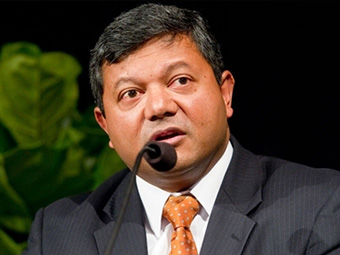
Dr. Arunava Majumdar
Jay Precourt Provostial Professor, Department of Mechanical Engineering, Stanford University, a faculty member of the Departments of Mechanical Engineering and Materials Science and Engineering (by courtesy), and co-director of the Precourt Institute for Energy, Stanford University
Dr. Majumdar’s current research focuses on using electrochemical reactions for thermal energy conversion, thermochemical water splitting reactions to produce carbon-free hydrogen, understanding the limits of heat transport in nanostructured materials and a new effort to re-engineer the electricity grid.
Prior to joining Stanford, Dr. Majumdar was the Vice President for Energy at Google, where he created several energy technology initiatives and advised the company on its broader energy strategy. He continues to be a consultant to Google on energy.
In October 2009, Dr. Arun Majumdar was nominated by President Obama and confirmed by the Senate to become the Founding Director of the Advanced Research Projects Agency - Energy (ARPA - E), where he served till June 2012. Between March 2011 and June 2012, Dr. Majumdar served as the Acting Under Secretary of Energy, and a Senior Advisor to the Secretary of Energy.
Prior to joining the Department of Energy, Dr. Majumdar was the Almy and Agnes Maynard Chair Professor of Mechanical Engineering and Materials Science and Engineering at the University of California, Berkeley and the Associate Laboratory Director for Energy and Environment at Lawrence Berkeley National Laboratory.
Dr. Majumdar is a member of the US National Academy of Engineering and the American Academy of Arts and Sciences. He received his bachelor's degree in Mechanical Engineering at the Indian Institute of Technology, Bombay, in 1985, and his PhD from the University of California, Berkeley in 1989. He currently serves on the US Secretary of Energy’s Advisory Board, the Council for the National Academy of Engineering and the Electric Power Research Institute, as well as the Science Board of the Stanford Linear Accelerator Center (SLAC) and the Oak Ridge National Laboratory. He is a member of the International Advisory Panel for Energy of the Singapore Ministry of Trade and Industry and the US delegation for the US-India Track II dialogue on climate change and energy.
Prof. N. Balakrishnan is a prominent aerospace and computer scientist. Currently, he works at the Indian Institute of Science, Bangalore, as the Honorary Professor, at the department of aerospace engineering and supercomputer education research. He is also a visiting professor of Jawaharlal Nehru Centre for Advanced Scientific Research, Bangalore.
He has received a number of accolades for his contributions to the field of science and research, including the Homi J. Bhabha Award (2004), the Academy Excellence Award from the Defence Research and Development Organization (2009), and Prof. S. N. Mitra Memorial Award from the Indian National Academy of Engineering (2013). He was recently awarded the Distinguished Alumnus award of the Indian Institute of Science. In 2002, the Government of India honored him with the fourth highest civilian award in India, the Padma Shri.
Prof. Balakrishnan, a 2007 J. C. Bose National Fellow of the Department of Science and Technology, is an elected Fellow of The World Academy of Sciences, Indian National Science Academy, Indian Academy of Sciences, Indian National Academy of Engineering, National Academy of Sciences, India and Institution of Electronic and Telecommunication Engineers.
His scientific achievements and observations have been recorded in over 230 articles published in many peer reviewed national and international journals, Google Scholar, an online repository of scientific articles, listing 216 of them.
Professor Gupta’s focus of research is on energy efficiency from algorithms, devices to systems that scale from IC chips, and data centers to commercial buildings. His past contributions include SystemC modeling and SPARK parallelizing high-level synthesis, both of which have been incorporated into industrial practice. Earlier, Gupta led or co-led DARPA-sponsored efforts under the Data Intensive Systems (DIS) and Power Aware Computing and Communications (PACC) programs on the role of adaptation in energy efficient system architectures. He currently leads the NSF expeditions on variability and co-leads Non-Volatile Systems Laboratory at UCSD. In the recent past, Gupta and his students have received best paper nominations at the DAC'13, SC'10 and best paper / demo awards at IEEE / ACM DCOSS’08 and at IEEE / ACM IPSN / SPOTS’05.
Gupta currently serves as the Associate Director of the Qualcomm Institute at UCSD. He is a Fellow of the IEEE. He also serves as advisor to several startup and venture capital companies as well as advisory panels on cyberphysical systems. He received a Bachelor of Technology in electrical engineering from IIT Kanpur, India; a Master of Science in EECS from University of California, Berkeley; and a PhD in electrical engineering from Stanford University, US.
Engineering and Computer Science 2015
Pradeep K. Khosla is the eighth Chancellor of UC San Diego; as UC San Diego’s chief executive officer, he leads a campus with more than 30,000 students, six undergraduate colleges, five academic divisions, and five graduate and professional schools. While at UC San Diego, Khosla has initiated and led a comprehensive strategic planning process to unify the campus and define UC San Diego's future resulting in a Strategic Plan that outlines five overarching goals, four grand research themes, and 13 strategies to fulfill our sharpened mission and vision as a student-centered, research-focused, service-oriented public university.
An internationally renowned electrical and computer engineer, Khosla previously served as Dean of the College of Engineering at Carnegie Mellon University. He is an elected member of the National Academy of Engineering and the American Society for Engineering Education; a Fellow of the Institute of Electrical and Electronics Engineers, the American Society of Mechanical Engineers, the American Association for Advancement of Science, the American Association of Artificial Intelligence and the Indian Academy of Engineering.
In 2012, Khosla was named as one of the 50 most influential Indian-Americans by SiliconIndia.
Prof. Narayanamurti is credited with developing the field of phonon optics: the manipulation of monoenergetic acoustic beams at terahertz frequencies and is currently active in the field of semiconductor nanostructures.
Narayanamurti has served on numerous national and international advisory committees and is an elected member of the National Academy of Engineering, the Royal Swedish Academy of Engineering Sciences, and the American Academy of Arts and Sciences. He is a fellow of the American Physical Society; the American Association for the Advancement of Science; the Institute of Electrical and Electronics Engineers; and the Indian Academy of Sciences.
He has served on numerous advisory boards of the federal government, professional societies, national laboratories, and industry. In addition to serving in administrative and research roles, Narayanamurti lectures widely on solid state, computer and communication technologies, and on the management of Science, Technology and Public Policy.
Prior to joining Stanford, Dr. Arun Majumdar was the Vice President for Energy at Google, where he created several energy technology initiatives and advised the company on its broader energy strategy. He continues to be a consultant to Google on energy.
In October 2009, Dr. Arun Majumdar was nominated by President Obama and confirmed by the Senate to become the Founding Director of the Advanced Research Projects Agency - Energy (ARPA - E), where he served till June 2012. Between March 2011 and June 2012, Dr. Majumdar served as the Acting Under Secretary of Energy, and a Senior Advisor to the Secretary of Energy.
Prior to joining the Department of Energy, Dr. Majumdar was the Almy and Agnes Maynard Chair Professor of Mechanical Engineering and Materials Science and Engineering at the University of California, Berkeley and the Associate Laboratory Director for Energy and Environment at Lawrence Berkeley National Laboratory. His research career includes the science and engineering of nanoscale materials and devices as well as large engineered systems.
Dr. Majumdar is a member of the US National Academy of Engineering and the American Academy of Arts and Sciences. He received his bachelor's degree in Mechanical Engineering at the Indian Institute of Technology, Bombay, in 1985, and his PhD from the University of California, Berkeley in 1989. He currently serves on the US Secretary of Energy’s Advisory Board, the Council for the National Academy of Engineering and the Electric Power Research Institute, as well as the Science Board of the Stanford Linear Accelerator Center (SLAC) and the Oak Ridge National Laboratory. He is a member of the International Advisory Panel for Energy of the Singapore Ministry of Trade and Industry and the US delegation for the US-India Track II dialogue on climate change and energy.
Professor Gupta’s focus of research is on energy efficiency from algorithms, devices to systems that scale from IC chips, and data centers to commercial buildings. His past contributions include SystemC modeling and SPARK parallelizing high-level synthesis, both of which have been incorporated into industrial practice. Earlier, Gupta led or co-led DARPA-sponsored efforts under the Data Intensive Systems (DIS) and Power Aware Computing and Communications (PACC) programs on the role of adaptation in energy efficient system architectures. He currently leads the NSF expeditions on variability and co-leads Non-Volatile Systems Laboratory at UCSD. In the recent past, Gupta and his students have received best paper nominations at the DAC'13, SC'10 and best paper / demo awards at IEEE / ACM DCOSS’08 and at IEEE / ACM IPSN / SPOTS’05.
Gupta currently serves as the Chair of computer science and engineering department and as Associate Director of the Qualcomm Institute at UCSD. He is a Fellow of the IEEE. He also serves as advisor to several startup and venture capital companies as well as advisory panels on cyberphysical systems. He received a Bachelor of Technology in electrical engineering from IIT Kanpur, India; a Master of Science in EECS from University of California, Berkeley; and a PhD in electrical engineering from Stanford University, US.
Engineering and Computer Science 2014
Prof. Narayanamurti is credited with developing the field of phonon optics: the manipulation of monoenergetic acoustic beams at terahertz frequencies and is currently active in the field of semiconductor nanostructures.
Narayanamurti has served on numerous national and international advisory committees and is an elected member of the National Academy of Engineering, the Royal Swedish Academy of Engineering Sciences, and the American Academy of Arts and Sciences. He is a fellow of the American Physical Society; the American Association for the Advancement of Science; the Institute of Electrical and Electronics Engineers; and the Indian Academy of Sciences.
He has served on numerous advisory boards of the federal government, professional societies, national laboratories, and industry. In addition to serving in administrative and research roles, Narayanamurti lectures widely on solid state, computer and communication technologies, and on the management of Science, Technology and Public Policy.
Professor Gupta’s focus of research is on energy efficiency from algorithms, devices to systems that scale from IC chips, and data centers to commercial buildings. His past contributions include SystemC modeling and SPARK parallelizing high-level synthesis, both of which have been incorporated into industrial practice. Earlier, Gupta led or co-led DARPA-sponsored efforts under the Data Intensive Systems (DIS) and Power Aware Computing and Communications (PACC) programs on the role of adaptation in energy efficient system architectures. He currently leads the NSF expeditions on variability and co-leads Non-Volatile Systems Laboratory at UCSD. In the recent past, Gupta and his students have received best paper nominations at the DAC'13, SC'10 and best paper / demo awards at IEEE / ACM DCOSS’08 and at IEEE / ACM IPSN / SPOTS’05.
Gupta currently serves as the Chair of computer science and engineering department and as Associate Director of the Qualcomm Institute at UCSD. He is a Fellow of the IEEE. He also serves as advisor to several startup and venture capital companies as well as advisory panels on cyberphysical systems. He received a Bachelor of Technology in electrical engineering from IIT Kanpur, India; a Master of Science in EECS from University of California, Berkeley; and a PhD in electrical engineering from Stanford University, US.
Prior to joining Stanford, Dr. Arun Majumdar was the Vice President for Energy at Google, where he created several energy technology initiatives and advised the company on its broader energy strategy. He continues to be a consultant to Google on energy.
In October 2009, Dr. Arun Majumdar was nominated by President Obama and confirmed by the Senate to become the Founding Director of the Advanced Research Projects Agency - Energy (ARPA - E), where he served till June 2012. Between March 2011 and June 2012, Dr. Majumdar served as the Acting Under Secretary of Energy, and a Senior Advisor to the Secretary of Energy.
Prior to joining the Department of Energy, Dr. Majumdar was the Almy and Agnes Maynard Chair Professor of Mechanical Engineering and Materials Science and Engineering at the University of California, Berkeley and the Associate Laboratory Director for Energy and Environment at Lawrence Berkeley National Laboratory. His research career includes the science and engineering of nanoscale materials and devices as well as large engineered systems.
Dr. Majumdar is a member of the US National Academy of Engineering and the American Academy of Arts and Sciences. He received his bachelor's degree in Mechanical Engineering at the Indian Institute of Technology, Bombay, in 1985, and his PhD from the University of California, Berkeley in 1989. He currently serves on the US Secretary of Energy’s Advisory Board, the Council for the National Academy of Engineering and the Electric Power Research Institute, as well as the Science Board of the Stanford Linear Accelerator Center (SLAC) and the Oak Ridge National Laboratory. He is a member of the International Advisory Panel for Energy of the Singapore Ministry of Trade and Industry and the US delegation for the US-India Track II dialogue on climate change and energy.
Engineering and Computer Science 2013
Prof. Narayanamurti is credited with developing the field of phonon optics: the manipulation of monoenergetic acoustic beams at terahertz frequencies and is currently active in the field of semiconductor nanostructures.
Narayanamurti has served on numerous national and international advisory committees and is an elected member of the National Academy of Engineering, the Royal Swedish Academy of Engineering Sciences, and the American Academy of Arts and Sciences. He is a fellow of the American Physical Society; the American Association for the Advancement of Science; the Institute of Electrical and Electronics Engineers; and the Indian Academy of Sciences.
He has served on numerous advisory boards of the federal government, professional societies, national laboratories, and industry. In addition to serving in administrative and research roles, Narayanamurti lectures widely on solid state, computer and communication technologies, and on the management of Science, Technology and Public Policy.
Dr. Mashelkar served as Director General of the Council of Scientific and Industrial Research (CSIR) for over eleven years. He is a former President of the Indian National Science Academy. He is the first Chairperson and Chancellor of the Academy of Scientific and Innovative Research (AcSIR). Dr. Mashelkar is a Fellow of Royal Society (FRS), Foreign Fellow of American Academy of Arts and Science, Foreign Associate of National Academy of Science (USA) and National Academy of Engineering (USA), Fellow of Royal Academy of Engineering (UK), Australian Technological Science and Engineering Academy, and The Academy of Sciences for the Developing World. Dr. Mashelkar was awarded the Padma Vibhushan, the second highest civilian award in the Republic of India, in 2014. He has been honored with honorary doctorates from thirty-one universities, including University of London, University of Salford, University of Pretoria, University of Wisconsin, and Delhi University. In post-liberalized India, Dr. Mashelkar played a key role in shaping India’s science, technology, and innovation policies. His contribution to transforming publicly funded R&D institutions and developing balanced IP systems are well recognized. He has won over 50 national and international awards for his scientific contributions as well as leadership in Indian science.
Prof. Bryant has been on the faculty at Carnegie Mellon since 1984, starting as an Assistant Professor and progressing to his current rank of University Professor of Computer Science. He also holds a courtesy appointment in the Electrical and Computer Engineering Department.
Much of Dr. Bryant's research has focused on methods for formally verifying digital hardware, and more recently some forms of software. His 1986 paper on symbolic Boolean manipulation using Ordered Binary Decision Diagrams (BDDs) has one of the highest citation count of any publication in the computer science literature. More recently, he has become interested in the opportunities and challenges presented by computer systems working with very large data sets.
Dr. Bryant has received widespread recognition for his work. He is a fellow of the IEEE and the ACM, as well as a member of the National Academy of Engineering and the American Academy of Arts and Sciences. His awards include the 2007 IEEE Piore Award, the 1997 ACM Kanellakis Theory and Practice Award (shared with Edmund M. Clarke, Ken McMillan, and Allen Emerson) for contributing to the development of symbolic model checking, as well as the 1989 IEEE W.R.G. Baker Prize for the best paper appearing in any IEEE publication during the preceding year. In the field of electronic design automation, he has won both the IEEE/CEDA Phil Kaufman Award and the ACM/IEEE A. Richard Newton technical impact award.

Arunava Majumdar
Former Associate Laboratory Director for Energy and Environment, Lawrence Berkeley National Laboratory and Professor of Mechanical Engineering and Materials Science and Engineering, University of California, Berkeley and Former Founding Director, Advanced Research Projects Agency - Energy (ARPA-E), and Former Acting Undersecretary of Energy, US Department of Energy, USA
In October 2009, Dr. Arun Majumdar was nominated by President Obama and confirmed by the Senate to become the founding Director of the Advanced Research Projects Agency - Energy (ARPA-E), where he served till June 2012. Between March 2011 and June 2012, Dr. Majumdar also served as the Acting Under Secretary of Energy, and a Senior Advisor to the Secretary of Energy. Prior to joining the Department of Energy, Dr. Majumdar was the Almy and Agnes Maynard Chair Professor of Mechanical Engineering and Materials Science and Engineering at the University of California, Berkeley and the Associate Laboratory Director for Energy and Environment at Lawrence Berkeley National Laboratory. His research career includes the science and engineering of nanoscale materials and devices as well as large engineered systems. In 2005, Dr. Majumdar was elected a member of the National Academy of Engineering. He received his bachelor's degree in Mechanical Engineering at the Indian Institute of Technology, Bombay in 1985 and his Ph.D. from the University of California, Berkeley in 1989.
Engineering and Computer Science 2012
Prof. Khosla is the recipient of several awards including the ASEE George Westinghouse Award for Education (1999), Siliconindia Leadership award for Excellence in Academics and Technology (2000), the W. Wallace McDowell award from IEEE Computer Society (2001), Cyber Education Award from the Business Software Alliance (2007), the ASME Computers in Engineering Lifetime Achievement Award (2009), and the inaugural Pan IIT American Leadership Award for Academic Excellence (2009). He was awarded the Philip and Marsha Dowd Professorship in 1998, and named University Professor in 2008. For his contributions to technology and education he has been elected as Fellow of Institute of Electrical and Electronics Engineers (IEEE), Fellow of American Association of Artificial Intelligence (AAAI), Fellow of American Association for Advancement of Science (AAAS), Fellow of American Society of Mechanical Engineers (ASME), and member of the National Academy of Engineering (NAE). He is a frequent keynote speaker at international conferences, and invited to participate in thought leadership forums organized by Fortune Magazine, Advanced Micro Devices (AMD), Milken Institute, World Economic Forum, and Blouin Foundation, amongst others. He has served and currently serves on several boards of non-profit and for-profit, and government organizations.
Prof. Narayanamurti is credited with developing the field of phonon optics: the manipulation of monoenergetic acoustic beams at terahertz frequencies and is currently active in the field of semiconductor nanostructures.
Narayanamurti has served on numerous national and international advisory committees and is an elected member of the National Academy of Engineering, the Royal Swedish Academy of Engineering Sciences, and the American Academy of Arts and Sciences. He is a fellow of the American Physical Society; the American Association for the Advancement of Science; the Institute of Electrical and Electronics Engineers; and the Indian Academy of Sciences.
He has served on numerous advisory boards of the federal government, professional societies, national laboratories, and industry. In addition to serving in administrative and research roles, Narayanamurti lectures widely on solid state, computer and communication technologies, and on the management of Science, Technology and Public Policy
Dr. Mashelkar was the Director General of Council of Scientific and Industrial Research (CSIR) for over eleven years. He is also the first Chairperson and Chancellor of the Academy Of Scientific And Innovative Research (AcSIR). He was also the President of Indian National Science Academy. He is a Fellow of Royal Society (FRS), Foreign Fellow of American Academy of Arts & Science, Foreign Associate of National Academy of Science (USA) and National Academy of Engineering (USA), Fellow of Royal Academy of Engineering (UK), Australian Technological Science & Engineering Academy and The Academy of Sciences for the Developing World. Thirty universities have honoured him with honorary doctorates, which include Universities of London, Salford, Pretoria, Wisconsin and Delhi. In the post-liberalised India, Dr. Mashelkar has been a key architect of India’s science, technology and innovation policies. His contributions in transforming publicly funded R&D institutions and developing balanced IP systems are well recognized. He has won over 50 national and international awards for his scientific contributions as well as his leadership of Indian science.
Prof. Bryant has been on the faculty at Carnegie Mellon since 1984, starting as an Assistant Professor and progressing to his current rank of University Professor of Computer Science. He also holds a courtesy appointment in the Electrical and Computer Engineering Department.
Much of Dr. Bryant's research has focused on methods for formally verifying digital hardware, and more recently some forms of software. His 1986 paper on symbolic Boolean manipulation using Ordered Binary Decision Diagrams (BDDs) has one of the highest citation count of any publication in the computer science literature. More recently, he has become interested in the opportunities and challenges presented by computer systems working with very large data sets.
Dr. Bryant has received widespread recognition for his work. He is a fellow of the IEEE and the ACM, as well as a member of the National Academy of Engineering and the American Academy of Arts and Sciences. His awards include the 2007 IEEE Piore Award, the 1997 ACM Kanellakis Theory and Practice Award (shared with Edmund M. Clarke, Ken McMillan, and Allen Emerson) for contributing to the development of symbolic model checking, as well as the 1989 IEEE W.R.G. Baker Prize for the best paper appearing in any IEEE publication during the preceding year. In the field of electronic design automation, he has won both the IEEE/CEDA Phil Kaufman Award and the ACM/IEEE A. Richard Newton technical impact award.

Arunava Majumdar
Former Associate Laboratory Director for Energy and Environment, Lawrence Berkeley National Laboratory and Professor of Mechanical Engineering and Materials Science and Engineering, University of California, Berkeley and Former Founding Director, Advanced Research Projects Agency - Energy (ARPA-E), and Former Acting Undersecretary of Energy, US Department of Energy, USA
In October 2009, Dr. Arun Majumdar was nominated by President Obama and confirmed by the Senate to become the founding Director of the Advanced Research Projects Agency - Energy (ARPA-E), where he served till June 2012. Between March 2011 and June 2012, Dr. Majumdar also served as the Acting Under Secretary of Energy, and a Senior Advisor to the Secretary of Energy. Prior to joining the Department of Energy, Dr. Majumdar was the Almy and Agnes Maynard Chair Professor of Mechanical Engineering and Materials Science and Engineering at the University of California, Berkeley and the Associate Laboratory Director for Energy and Environment at Lawrence Berkeley National Laboratory. His research career includes the science and engineering of nanoscale materials and devices as well as large engineered systems. In 2005, Dr. Majumdar was elected a member of the National Academy of Engineering. He received his bachelor's degree in Mechanical Engineering at the Indian Institute of Technology, Bombay in 1985 and his Ph.D. from the University of California, Berkeley in 1989.
Engineering and Computer Science 2011
As Dean, Prof. Khosla serves as the Chief Academic Officer and the Chief Administrative Officer for the College of Engineering. He is the recipient of several awards including the ASEE George Westinghouse Award for Education (1999), Siliconindia Leadership award for Excellence in Academics and Technology (2000), the W. Wallace McDowell award from IEEE Computer Society (2001), Cyber Education Award from the Business Software Alliance (2007), the ASME Computers in Engineering Lifetime Achievement Award (2009), and the inaugural Pan IIT American Leadership Award for Academic Excellence (2009). He was awarded the Philip and Marsha Dowd Professorship in 1998, and named University Professor in 2008. For his contributions to technology and education he has been elected as Fellow of Institute of Electrical and Electronics Engineers (IEEE), Fellow of American Association of Artificial Intelligence (AAAI), Fellow of American Association for Advancement of Science (AAAS), Fellow of American Society of Mechanical Engineers (ASME), and member of the National Academy of Engineering (NAE). He is a frequent keynote speaker at international conferences, and invited to participate in thought leadership forums organized by Fortune Magazine, Advanced Micro Devices (AMD), Milken Institute, World Economic Forum, and Blouin Foundation, amongst others. He has served and currently serves on several boards of non-profit and for-profit, and government organizations.
Prof. Narayanamurti is credited with developing the field of phonon optics: the manipulation of monoenergetic acoustic beams at terahertz frequencies and is currently active in the field of semiconductor nanostructures.
Narayanamurti has served on numerous national and international advisory committees and is an elected member of the National Academy of Engineering, the Royal Swedish Academy of Engineering Sciences, and the American Academy of Arts and Sciences. He is a fellow of the American Physical Society; the American Association for the Advancement of Science; the Institute of Electrical and Electronics Engineers; and the Indian Academy of Sciences.
He has served on numerous advisory boards of the federal government, professional societies, national laboratories, and industry. In addition to serving in administrative and research roles, Narayanamurti lectures widely on solid state, computer and communication technologies, and on the management of Science, Technology and Public Policy.
Dr. Mashelkar was the Director General of Council of Scientific and Industrial Research (CSIR) for over eleven years. He was also the President of Indian National Science Academy. He is a Fellow of Royal Society (FRS), Foreign Fellow of American Academy of Arts & Science, Foreign Associate of National Academy of Science (USA) and National Academy of Engineering (USA), Fellow of Royal Academy of Engineering (UK), Australian Technological Science & Engineering Academy and The Academy of Sciences for the Developing World. Twenty-nine universities have honoured him with honorary doctorates, which include Universities of London, Salford, Pretoria, Wisconsin and Delhi. In the post-liberalised India, Dr. Mashelkar has been a key architect of India’s science, technology and innovation policies. His contributions in transforming publicly funded R&D institutions and developing balanced IP systems are well recognized. He has won over 50 national and international awards for his scientific contributions as well as his leadership of Indian science.
Prof. Bryant has been on the faculty at Carnegie Mellon since 1984, starting as an Assistant Professor and progressing to his current rank of University Professor of Computer Science. He also holds a courtesy appointment in the Electrical and Computer Engineering Department.
Much of Dr. Bryant's research has focused on methods for formally verifying digital hardware, and more recently some forms of software. His 1986 paper on symbolic Boolean manipulation using Ordered Binary Decision Diagrams (BDDs) has one of the highest citation count of any publication in the computer science literature. More recently, he has become interested in the opportunities and challenges presented by computer systems working with very large data sets.
Dr. Bryant has received widespread recognition for his work. He is a fellow of the IEEE and the ACM, as well as a member of the National Academy of Engineering and the American Academy of Arts and Sciences. His awards include the 2007 IEEE Piore Award, the 1997 ACM Kanellakis Theory and Practice Award (shared with Edmund M. Clarke, Ken McMillan, and Allen Emerson) for contributing to the development of symbolic model checking, as well as the 1989 IEEE W.R.G. Baker Prize for the best paper appearing in any IEEE publication during the preceding year. In the field of electronic design automation, he has won both the IEEE/CEDA Phil Kaufman Award and the ACM/IEEE A. Richard Newton technical impact award.
Prof. Mehlhorn was the founding director of the Max Planck Institute for Computer Science and continues to be a director at the institute. He was vice-president of the Max Planck Society from 2002 to 2008. Having graduated in 1971 from the Technical University of Munich, where he studied computer science and mathematics, he earned his Ph.D. in 1974 from Cornell University. He was chair of computer science department in Saarland University in Saarbrücken, Germany. Since 1990 he has been director at the Max Planck Institute for Computer Science, also in Saarbrücken. He has been on the editorial boards of ten journals, a trustee of the International Computer Science Institute in Berkeley, California, and a member of the board of governors of Jacobs University Bremen. He won the Gottfried Wilhelm Leibniz Prize(1986), the Karl Heinz Beckurts Award(1994), the Konrad Zuse Medal(1995), the EATCS-Award (2010), the ACM Paris Kanellakis Theory and Practice Award (2010) and was named a Fellow of the Association of Computing Machinery(1999), a member of the Berlin-Brandenburg Academy of Sciences(2001), and a member of the German Academy of Sciences Leopoldina(2004). He has received honorary doctorates from the Otto von Guericke University of Magdeburg in 2004, the University of Waterloo in 2006, and the University of Aarhus in 2008. Mehlhorn has over 250 scientific publications. He is best known as one of the developers of LEDA, the Library of Efficient Data types and Algorithms; he is also known for his work on shortest path algorithms, perfect hashing, parallel algorithms, and computational geometry.
Engineering and Computer Science 2010
He has been elected to US National Academy of Engineering, American Academy of Arts and Sciences, Indian National Academy of Engineering, Indian Academy of Sciences, Royal Spanish Academy of Sciences, Academy of Sciences of the Developing World, Italy, and German National Academy of Sciences. He is a recipient of the 2006 Acta Materialia Gold Medal, 2007 European Materials Medal, 2008 Eringen Medal of the Society of Engineering Science, and a Senior Humboldt Research Prize from Germany. Suresh holds an honorary doctorate from Sweden's Royal Institute of Technology. In 2006, MIT's Technology Review magazine selected Suresh as one of the top 10 researchers whose work in nanomechanics of biological systems will have "significant impact on business, medicine or culture".
Prof. Sreenivasan is well known for wide-ranging contributions to physics and engineering: turbulence in fluids (especially the application of fractals and multifractals), reacting flows, cryogenic helium and nonlinear dynamics. He is Fellow of the American Academy of Arts & Sciences, Fellow of the Third World Academy of Sciences, member of the US National Academy of Engineering, member of the US National Academy of Sciences, and of the Indian Academy of Sciences and the Indian National Science Academy, among others. He has received a number of awards and honors, including, most recently, the 2008 Nicholson Medal from the American Physical Society.
Prof. Mehlron was the founding director of the Max Planck Institute for Computer Science and continues to be a director at the institute. He was vice-president of the Max Planck Society from 2002 to 2008. Having graduated in 1971 from the Technical University of Munich, where he studied computer science and mathematics, he earned his Ph.D. in 1974 from Cornell University. He was chair of computer science department in Saarland University in Saarbrücken, Germany. Since 1990 he has been director at the Max Planck Institute for Computer Science, also in Saarbrücken. He has been on the editorial boards of ten journals, a trustee of the International Computer Science Institute in Berkeley, California, and amember of the board of governors of Jacobs University Bremen. He won the Gottfried Wilhelm Leibniz Prize(1986), the Karl Heinz Beckurts Award(1994), the Konrad Zuse Medal(1995) and was named a Fellow of the Association of Computing Machinery(1999), a member of the Berlin-Brandenburg Academy of Sciences(2001), and a member of the German Academy of Sciences Leopoldina(2004). He has received honorary doctorates from the Otto von Guericke University of Magdeburg in 2004, the University of Waterloo in 2006, and the University of Aarhus in 2008. Mehlhorn has over 250 scientific publications. He is best known as one of the developers of LEDA, the Library of Efficient Data types and Algorithms; he is also known for his work on shortest path algorithms, perfect hashing, parallel algorithms, and computational geometry.
As Dean, Prof. Khosla serves as the Chief Academic Officer and the Chief Administrative Officer for the College of Engineering. He is the recipient of several awards including the ASEE George Westinghouse Award for Education (1999), Siliconindia Leadership award for Excellence in Academics and Technology (2000), the W. Wallace McDowell award from IEEE Computer Society (2001), Cyber Education Award from the Business Software Alliance (2007), the ASME Computers in Engineering Lifetime Achievement Award (2009), and the inaugural Pan IIT American Leadership Award for Academic Excellence (2009). He was awarded the Philip and Marsha Dowd Professorship in 1998, and named University Professor in 2008. For his contributions to technology and education he has been elected as Fellow of Institute of Electrical and Electronics Engineers (IEEE), Fellow of American Association of Artificial Intelligence (AAAI), Fellow of American Association for Advancement of Science (AAAS), Fellow of American Society of Mechanical Engineers (ASME), and member of the National Academy of Engineering (NAE). He is a frequent keynote speaker at international conferences, and invited to participate in thought leadership forums organized by Fortune Magazine, Advanced Micro Devices (AMD), Milken Institute, World Economic Forum, and Blouin Foundation, amongst others. He has served and currently serves on several boards of non-profit and for-profit, and government organizations.
Prof. Shih became founding president of KAUST after nine years as President and Vice-Chancellor of the National University of Singapore (NUS). He is chairman emeritus of the Association of Pacific Rim Universities (APRU), and has chaired the Governing Board of the APRU World Institute. He is a foreign associate of the U.S. National Academy of Engineering and is a foreign honorary member of the American Academy of Arts and Sciences. As a researcher, Professor Shih has made significant contributions in nonlinear fracture mechanics and computational methods for fracture analyses. Professor Shih is listed by the Institute for Scientific Information (ISI) as among the world's most highly cited engineering researchers. Among his honors are the George Irwin Medal and the Ted Belytschko Applied Mechanics Award, from the American Society for Testing and Materials and the American Society for Mechanical Engineers respectively, the inaugural Asia Pacific Chief Executive Leadership Award from the Council for Advancement and Support for Education, and the French decoration "Chevalier" in the Order of the "Legion d'Honneur". He is a member of the MIT Corporation Visiting Committee for the Department of Materials Science and Engineering.
Engineering and Computer Science 2009
He has been elected to US National Academy of Engineering, American Academy of Arts and Sciences, Indian National Academy of Engineering, Indian Academy of Sciences, Royal Spanish Academy of Sciences, Academy of Sciences of the Developing World, Italy, and German National Academy of Sciences. He is a recipient of the 2006 Acta Materialia Gold Medal, 2007 European Materials Medal, 2008 Eringen Medal of the Society of Engineering Science, and a Senior Humboldt Research Prize from Germany. Suresh holds an honorary doctorate from Sweden's Royal Institute of Technology. In 2006, MIT's Technology Review magazine selected Suresh as one of the top 10 researchers whose work in nanomechanics of biological systems will have "significant impact on business, medicine or culture".
Prof. Sreenivasan is well known for wide-ranging contributions to physics and engineering: turbulence in fluids (especially the application of fractals and multifractals), reacting flows, cryogenic helium and nonlinear dynamics. He is Fellow of the American Academy of Arts & Sciences, Fellow of the Third World Academy of Sciences, member of the US National Academy of Engineering, member of the US National Academy of Sciences, and of the Indian Academy of Sciences and the Indian National Science Academy, among others. He has received a number of awards and honors, including, most recently, the 2008 Nicholson Medal from the American Physical Society.
Prof. Liskov is a member of the National Academy of Engineering, a fellow of the American Academy of Arts and Sciences, and a fellow of the ACM. She received the ACM Turing Award(2009), the ACM SIGPLAN Programming Language Achievement Award(2008), the IEEE Von Neumann medal(2004), a lifetime achievement award from the Society of Women Engineers(1996), and was named one of the 50 most important women in science by Discover Magazine(2003). Her research interests include distributed systems, replication algorithms to provide fault-tolerance, programming methodology, and programming languages. Her current research projects include Byzantine-fault-tolerant storage systems, peer-to-peer computing, and support for automatic deployment of software upgrades in large-scale distributed systems.
Prof. Mehlron was the founding director of the Max Planck Institute for Computer Science and continues to be a director at the institute. He was vice-president of the Max Planck Society from 2002 to 2008. Having graduated in 1971 from the Technical University of Munich, where he studied computer science and mathematics, he earned his Ph.D. in 1974 from Cornell University. He was chair of computer science department in Saarland University in Saarbrücken, Germany. Since 1990 he has been director at the Max Planck Institute for Computer Science, also in Saarbrücken. He has been on the editorial boards of ten journals, a trustee of the International Computer Science Institute in Berkeley, California, and amember of the board of governors of Jacobs University Bremen. He won the Gottfried Wilhelm Leibniz Prize(1986), the Karl Heinz Beckurts Award(1994), the Konrad Zuse Medal(1995) and was named a Fellow of the Association of Computing Machinery(1999), a member of the Berlin-Brandenburg Academy of Sciences(2001), and a member of the German Academy of Sciences Leopoldina(2004). He has received honorary doctorates from the Otto von Guericke University of Magdeburg in 2004, the University of Waterloo in 2006, and the University of Aarhus in 2008. Mehlhorn has over 250 scientific publications. He is best known as one of the developers of LEDA, the Library of Efficient Data types and Algorithms; he is also known for his work on shortest path algorithms, perfect hashing, parallel algorithms, and computational geometry.
Prof. Shih became founding president of KAUST after nine years as President and Vice-Chancellor of the National University of Singapore (NUS). He is chairman emeritus of the Association of Pacific Rim Universities (APRU), and has chaired the Governing Board of the APRU World Institute. He is a foreign associate of the U.S. National Academy of Engineering and is a foreign honorary member of the American Academy of Arts and Sciences. As a researcher, Professor Shih has made significant contributions in nonlinear fracture mechanics and computational methods for fracture analyses. Professor Shih is listed by the Institute for Scientific Information (ISI) as among the world's most highly cited engineering researchers. Among his honors are the George Irwin Medal and the Ted Belytschko Applied Mechanics Award, from the American Society for Testing and Materials and the American Society for Mechanical Engineers respectively, the inaugural Asia Pacific Chief Executive Leadership Award from the Council for Advancement and Support for Education, and the French decoration "Chevalier" in the Order of the "Legion d'Honneur". He is a member of the MIT Corporation Visiting Committee for the Department of Materials Science and Engineering.

